

Maya Angelou
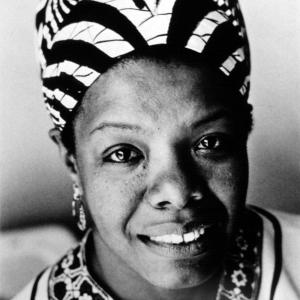
Poet, dancer, singer, activist, and scholar Maya Angelou was a world-famous author. She was best known for her unique and pioneering autobiographical writing style.
On April 4, 1928, Marguerite Ann Johnson, known to the world as Maya Angelou, was born in St. Louis, Missouri. Due to her parents’ tumultuous marriage and subsequent divorce, Angelou went to live with her paternal grandmother in Stamps, Arkansas at an early age. Her older brother, Bailey, gave Angelou her nickname “Maya.”
Returning to her mother’s care briefly at the age of seven, Angelou was raped by her mother’s boyfriend. He was later jailed and then killed when released from jail. Believing that her confession of the trauma had a hand in the man’s death, Angelou became mute for six years. During her mutism and into her teens, she again lived with her grandmother in Arkansas.
Angelou’s interest in the written word and the English language was evident from an early age. Throughout her childhood, she wrote essays, poetry, and kept a journal. When she returned to Arkansas, she took an interest in poetry and memorized works by Shakespeare and Poe.
Prior to the start of World War II, Angelou moved back in with her mother, who at this time was living in Oakland, California. She attended George Washington High School and took dance and drama courses at the California Labor School.
When war broke out, Angelou applied to join the Women’s Army Corps. However, her application was rejected because of her involvement in the California Labor School, which was said to have Communist ties. Determined to gain employment, despite being only 15 years old, she decided to apply for the position of a streetcar conductor. Many men had left their jobs to join the services, enabling women to fill them. However, Angelou was barred from applying at first because of her race. But she was undeterred. Every day for three weeks, she requested a job application, but was denied. Finally, the company relented and handed her an application. Because she was under the legal working age, she wrote that she was 19. She was accepted for the position and became the first African American woman to work as a streetcar conductor in San Francisco. Angelou was employed for a semester but then decided to return to school. She graduated from Mission High School in the summer of 1944 and soon after gave birth to her only child, Clyde Bailey (Guy) Johnson.
After graduation, Angelou undertook a series of odd jobs to support herself and her son. In 1949, she married Tosh Angelos, an electrician in the US Navy. She adopted a form of his surname and kept it throughout her life, though the marriage ended in divorce in 1952.
Angelou was also noted for her talents as a singer and dancer, particularly in the calypso and cabaret styles. In the 1950s, she performed professionally in the US, Europe, and northern Africa, and sold albums of her recordings.
In 1950, African American writers in New York City formed the Harlem Writers Guild to nurture and support the publication of Black authors. Angelou joined the Guild in 1959. She also became active in the Civil Rights Movement and served as the northern coordinator of the Southern Christian Leadership Conference, a prominent African American advocacy organization
In 1969, Angelou published I Know Why the Caged Bird Sings , an autobiography of her early life. Her tale of personal strength amid childhood trauma and racism resonated with readers and was nominated for the National Book Award. Many schools sought to ban the book for its frank depiction of sexual abuse, but it is credited with helping other abuse survivors tell their stories. I Know Why the Caged Bird Sings has been translated into numerous languages and has sold over a million copies worldwide. Angelou eventually published six more autobiographies, culminating in 2013’s Mom & Me & Mom.
She wrote numerous poetry volumes, such as the Pulitzer Prize-nominated Just Give me a Drink of Water 'fore I Diiie (1971), as well as several essay collections. She also recorded spoken albums of her poetry, including “On the Pulse of the Morning,” for which she won a Grammy for Best Spoken Word Album. The poem was originally written for and delivered at President Bill Clinton’s inauguration in 1993. She also won a Grammy in 1995, and again in 2002, for her spoken albums of poetry.
Angelou carried out a wide variety of activities on stage and screen as a writer, actor, director, and producer. In 1972, she became the first African American woman to have her screen play turned into a film with the production of Georgia, Georgia . Angelou earned a Tony nomination in 1973 for her supporting role in Jerome Kitty’s play Look Away , and portrayed Kunta Kinte’s grandmother in the television miniseries Roots in 1977.
She was recognized by many organizations both nationally and internationally for her contributions to literature. In 1981, Wake Forest University offered Angelou the Reynolds Professorship of American Studies. President Clinton awarded Angelou the National Medal of Arts in 2000. In 2012, she was a member of the inaugural class inducted into the Wake Forest University Writers Hall of Fame. The following year, she received the National Book Foundation’s Literarian Award for outstanding service to the American literary community. Angelou also gave many commencement speeches and was awarded more than 30 honorary degrees in her lifetime.
Angelou died on May 28, 2014. Several memorials were held in her honor, including ones at Wake Forest University and Glide Memorial Church in San Francisco. To honor her legacy, the US Postal Service issued a stamp with her likeness on it in 2015. (The US Postal Service mistakenly included a quote on the stamp that has long been associated with Angelou but was actually first written by Joan Walsh Anglund .)
In 2010, President Barack Obama awarded Angelou the Presidential Medal of Freedom, the country’s highest civilian honor. It was a fitting recognition for Angelou’s remarkable and inspiring career in the arts.
Angelou, Maya. I Know Why the Caged Bird Sings. (New York: Random House, 1969). Angelou, Maya. Maya Angelou: A Glorious Celebration. (New York: Doubleday, 2008).
“Poet – Maya Angelou.” Academy of American Poets. Accessed August 8, 2017. https://www.poets.org/poetsorg/poet/maya-angelou
Brown, Emma. “Maya Angelou, Writer and Poet, dies at age 86.” The Washington Post, May 28, 2014. Accessed August 8, 2017. https://www.washingtonpost.com/entertainment/maya-angelou-writer-and-poet-dies-at-age-86/2014/05/28/2948ef5e-c5da-11df-94e1-c5afa35a9e59_story.html?utm_term=.408fffb9a82c
Brown , DeNeen L. “Maya Angelou honored for her first job as a street car conductor in San Francisco.” The Washington Post, March 12, 2014. Accessed August 8, 2017. https://www.washingtonpost.com/blogs/local/wp/2014/03/12/maya-angelou-honored-for-her-first-job-as-a-street-car-conductor-in-san-francisco/?tid=a_inl&utm_term=.92c836957f2f
“About Harlem Writers Guild.” Harlem Writers Guild. Accessed August 10, 2017. http://theharlemwritersguild.org/about.html
Moore, Lucinda. “Growing Up Maya Angelou.” Smithsonian.com, April 2013. Accessed August 8, 2017. http://www.smithsonianmag.com/arts-culture/growing-up-maya-angelou-79582387/
Nixon, Ron. “Postal Service Won’t Reissue Maya Angelou Stamp.” The New York Times, April 8, 2017. Accessed August 8, 2017. https://www.nytimes.com/2015/04/09/us/postal-service-wont-reissue-maya-angelou-stamp.html
“History.” Southern Christian Leadership Conference. Accessed August 10, 2017. http://nationalsclc.org/about-us/history/
Thursby, Jacqueline S. "Angelou, Maya (4 Apr. 1928–28 May 2014), writer, performer, and activist." American National Biography. 29 Nov. 2018; Accessed 7 Dec. 2021. https://doi.org/10.1093/anb/9780198606697.013.00700
“Dr. Maya Angelou.” National Book Foundation. Accessed December 7, 2021. https://www.nationalbook.org/people/dr-maya-angelou/#fullBio
MLA - Spring, Kelly. “Maya Angelou." National Women's History Museum. National Women's History Museum, 2017. Date accessed.
Chicago - Spring, Kelly. "Maya Angelou." National Women's History Museum. 2017. www.womenshistory.org/education-resources/biographies/maya-angelou.
Photo Credit: MAYA ANGELOU, circa 1976. Courtesy: CSU Archives / Everett Collection.
Angelou, Maya. Just Give me a Drink of Water ‘fore I Diiie . (New York: Bantam, 1976).
Angelou, Maya. Mom & Me & Mom . (London: Virago, 2013).
“THE INAUGURATION; Maya Angelou: 'On the Pulse of Morning’.” The New York Times, January 21 1993. http://www.nytimes.com/1993/01/21/us/the-inauguration-maya-angelou-on-the-pulse-of-morning.html Classroom Posters:
- Maya Angelou Classroom Poster (11x17 in) | Maya Angelou Classroom Poster (24x36 in)
Related Biographies

Stacey Abrams

Abigail Smith Adams

Jane Addams

Toshiko Akiyoshi
Related background, “when we sing, we announce our existence”: bernice johnson reagon and the american spiritual', mary church terrell , belva lockwood and the precedents she set for women’s rights, faith ringgold and her fabulous quilts.
Maya Angelou
Maya Angelou was a multitalented poet and author known for her acclaimed 1969 memoir, I Know Why the Caged Bird Sings .
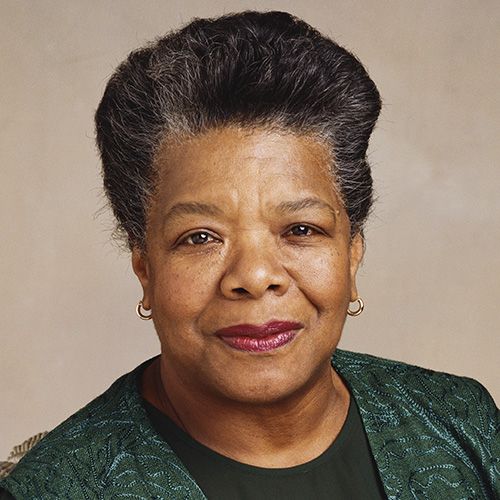
We may earn commission from links on this page, but we only recommend products we back.
Quick Facts
Life as an performer and activist, movie career, son and husbands, legacy: maya angelou quarter and more, who was maya angelou.
A multitalented writer and performer, Maya Angelou is best known for her work as an author and poet . Her 1969 memoir, I Know Why the Caged Bird Sings , made literary history as the first nonfiction bestseller by a Black woman. Some of her famous poems include “Phenomenal Woman,” “Still I Rise,” and “On the Pulse of Morning,” which she recited at President Bill Clinton ’s inauguration in 1993 and which earned her a Grammy Award. Angelou also enjoyed a career as a Tony- and Emmy-nominated actor and singer in plays, musicals, and onscreen. She became the first Black woman to have a screenplay produced with the 1972 movie Georgia, Georgia . In her work as a civil rights activist , she collaborated with Martin Luther King Jr. and Malcolm X , among others. The Presidential Medal of Freedom recipient died in May 2014 at age 86.
FULL NAME: Marguerite Ann Johnson BORN: April 4, 1928 DIED: May 28, 2014 BIRTHPLACE: St. Louis, Missouri SPOUSES: Tosh Angelos (c. 1949-1952), Vusumzi Make (c. 1961), and Paul Du Feu (c. 1973-1981) CHILD: Guy Johnson ASTROLOGICAL SIGN: Aries
Maya Angelou was born Marguerite Ann Johnson on April 4, 1928, in St. Louis.
She had a difficult childhood. Her parents split up when she was very young, and she and her older brother, Bailey, were sent to live with their paternal grandmother, Anne Henderson, in Stamps, Arkansas. Bailey gave Marguerite the nickname “Maya,” which she would adopt as her preferred name later in life.
As an African American, Angelou experienced firsthand racial prejudices and discrimination in Arkansas. She also suffered violence at home when she was around the age of 7. During a visit with her mother, Maya was raped by her mother’s boyfriend. As vengeance for the sexual assault, her uncles killed the boyfriend.
Young Maya was so traumatized by the experience that she stopped talking. She returned to Arkansas and spent about five years as a virtual mute.
A short-lived high school relationship resulted in Maya becoming pregnant. She was 16 years old whens he delivered her son, Guy Johnson, in 1944. After giving birth, she worked a number of jobs to support herself and her child.
Around this time, Maya moved to San Francisco and won a scholarship to study dance and acting at the California Labor School. She also became the first Black female cable car conductor, a job she held only briefly, in San Francisco.
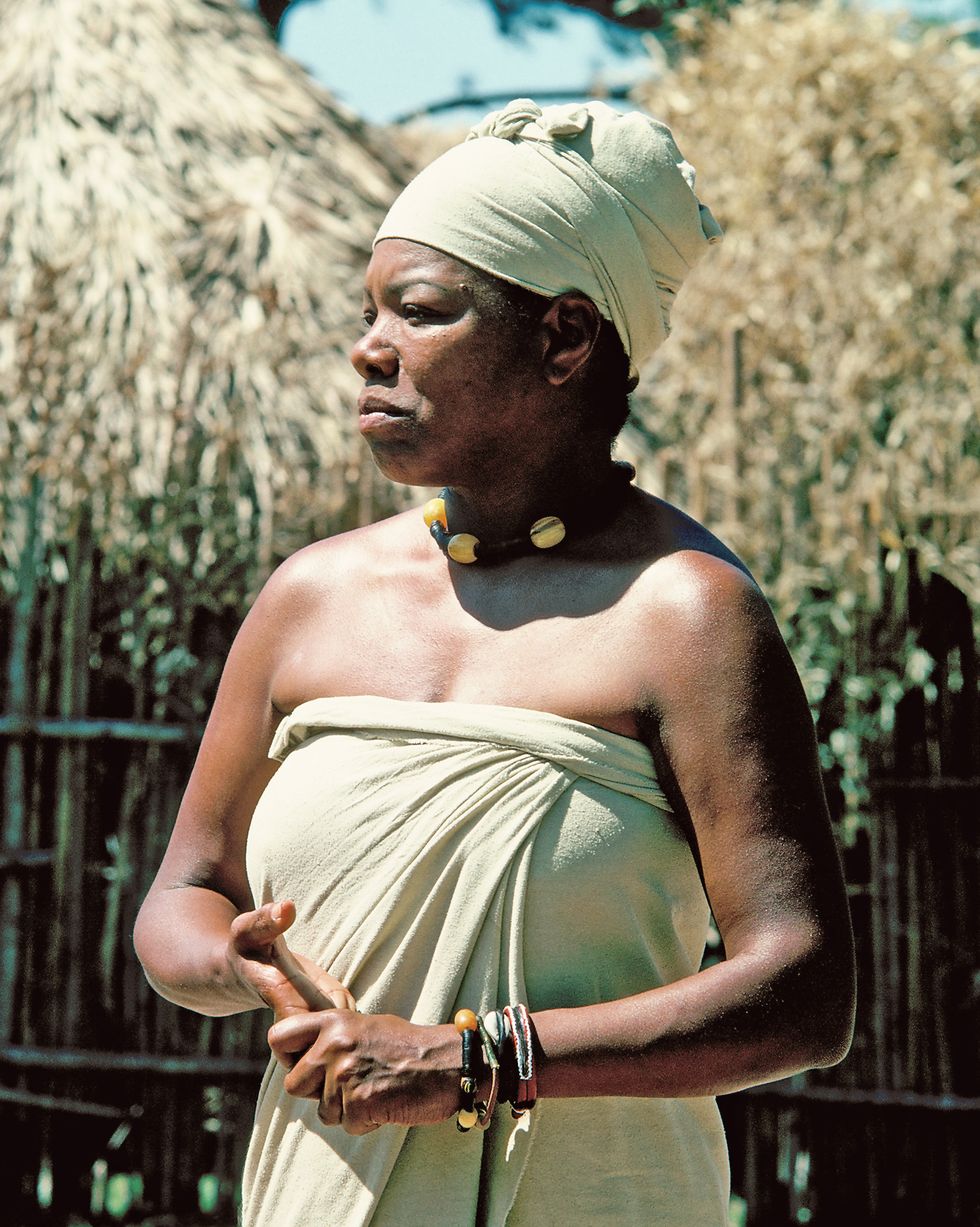
In the mid-1950s, the world began to know Maya Angelou, her professional name adapted from her first husband’s last name, when her career as an actor and singer took off. She landed a role in a touring production of Porgy and Bess , later appearing in the off-Broadway production Calypso Heat Wave (1957) and releasing her first album, Miss Calypso (1957).
A member of the Harlem Writers Guild and a civil rights activist , Angelou organized and starred in the musical revue Cabaret for Freedom as a benefit for the Southern Christian Leadership Conference, which Martin Luther King Jr. helped found before becoming its first president. Angelou also served as the SCLC’s northern coordinator and became a close to King.
In 1961, Angelou appeared in an off-Broadway production of Jean Genet’s The Blacks with James Earl Jones , Lou Gossett Jr., and Cicely Tyson . Afterward, the performer retreated from the theater scene for much of the 1960s. She lived abroad, first in Egypt and then in Ghana, and worked as an editor and a freelance writer. Angelou also held a position at the University of Ghana for a time.
In Ghana, she also joined a community of “Revolutionist Returnees” exploring pan-Africanism and became close with activist and Black nationalist leader Malcolm X . In 1964, upon returning to the United States, Angelou helped Malcolm X set up the Organization of Afro-American Unity, which disbanded after his assassination the following year.
Back in the United States, Angelou earned a Tony Award nomination for her role in the play Look Away (1973) and an Emmy Award nomination for her work on the television miniseries Roots (1977), among other honors.
Just Give Me a Cool Drink of Water ’fore I Diiie
Angelou published several collections of poetry, but her most famous was 1971’s collection Just Give Me a Cool Drink of Water ’fore I Diiie , which was nominated for the Pulitzer Prize.
Other famous collections of Angelou’s poetry include:
- Oh Pray My Wings Are Gonna Fit Me Well (1975), which includes Angelou’s poem “Alone,”
- And Still I Rise (1978), which features the beloved poem “Phenomenal Woman,”
- Shaker, Why Don’t You Sing? (1983),
- I Shall Not Be Moved (1990), featuring the poem “Human Family,” and
- Even the Stars Look Lonesome (1997).
Apple famously used a video of Angelou reading her poem “Human Family” in an advertisement at the 2016 Olympics.
“On the Pulse of Morning”
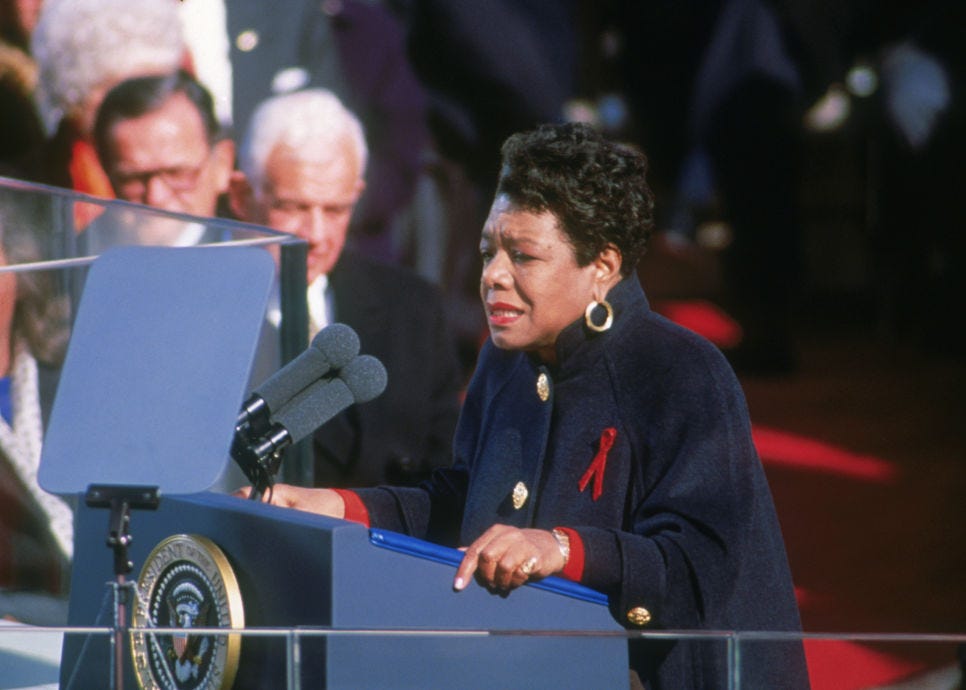
One of her most famous works, Angelou wrote the poem “On the Pulse of Morning” for President Bill Clinton ’s inaugural ceremony in January 1993. Her recitation at the ceremony marked the first inaugural poem reading since 1961, when Robert Frost delivered “The Gift Outright” at John F. Kennedy ’s inauguration. Angelou went on to win a Grammy Award for Best Spoken Word Album for the audio version of “On the Pulse of Morning.”
Other well-known poems by Angelou include “His Day Is Done,” a 1962 tribute poem Angelou wrote for Nelson Mandela as he made his secret journey from Africa to London, and “Amazing Peace,” which she wrote in 2005 for the White House tree-lighting ceremony.
In addition to her books of poetry, Angelou also wrote several memoirs and even cookbooks. She won two NAACP Image Awards in the Outstanding Literary Work (Nonfiction) category for her 2005 cookbook and 2008’s Letter to My Daughter .
I Know Why the Caged Bird Sings
Angelou’s friend and fellow writer James Baldwin urged her to write about her life experiences. The resulting work was the enormously successful 1969 memoir about her childhood and young adult years, I Know Why the Caged Bird Sings .
The poignant story made literary history as the first nonfiction bestseller by a Black woman. The book, which made Angelou an international star, continues to be regarded as her most popular autobiographical work.
In 1995, Angelou was lauded for remaining on The New York Times ’ paperback nonfiction bestseller list for two years, the longest-running record in the chart’s history at the time.
Gather Together in My Name
Angelou’s follow-up to I Know Why the Caged Bird Sings , this 1974 memoir covers her life as an unemployed teenage mother in California, when she turned to narcotics and prostitution.
Singin’ and Swingin’ and Gettin’ Merry Like Christmas
Angelou wrote this autobiography, published in 1976, about her early career as a singer and actor.
The Heart of a Woman
Angelou crafted this 1981 memoir about leaving California with her son for New York, where she took part in the Civil Rights Movement .
All God’s Children Need Traveling Shoes
A lyrical exploration about what it means to be an African American in Africa, this autobiographical book was published in 1986 and covers the years Angelou spent living in Ghana.
Wouldn’t Take Nothing for My Journey Now
This inspirational essay collection from 1994 features Angelou’s insights about spirituality and living well.
A Song Flung Up to Heaven
Another autobiographical work, A Song Flung Up to Heaven (2002) explores Angelou’s return from Africa to the United States and her ensuing struggle to cope with the devastating assassinations of two human rights leaders with whom she worked: Malcolm X and Martin Luther King Jr .
King was killed on Angelou’s 40 th birthday, leading the author to stop celebrating her birthday for years afterward. She also sent flowers to King’s widow, Coretta Scott King , for more than 30 years, until Coretta’s death in 2006.
A Song Flung Up to Heaven ends as Angelou begins work on I Know Why the Caged Bird Sings.
Letter to My Daughter
Dedicated to a daughter Angelou never had, this 2008 book of essays features Angelou’s advice for young women about living a life of meaning.
Mom & Me & Mom
In this 2013 memoir, Angelou discusses her complicated relationship with her mother who abandoned her during childhood.
Interested in health, Angelou’s published cookbooks include Hallelujah! The Welcome Table: A Lifetime of Memories With Recipes (2005) and Great Food, All Day Long (2010).
After publishing I Know Why the Caged Bird Sings , Angelou broke new ground artistically, educationally, and socially by writing the movie Georgia, Georgia (1972). The drama made her the first African American woman to have a screenplay produced.
In 1998, seeking new creative challenges, Angelou made her directorial debut with Down in the Delta , starring Alfre Woodard. Her work on the film was recognized with the Chicago International Film Festival’s 1998 Audience Choice Award and a nod from the Acapulco Black Film Festival in 1999.
Beginning in 1982, Angelou also returned to teaching at Wake Forest University in North Carolina. Over the years, she led a number of humanities courses, including “Race, Politics and Literature,” “African Culture and Impact on U.S.,” and “Race in the Southern Experience.” In 2011, Barack Obama awarded her the Presidential Medal of Freedom.
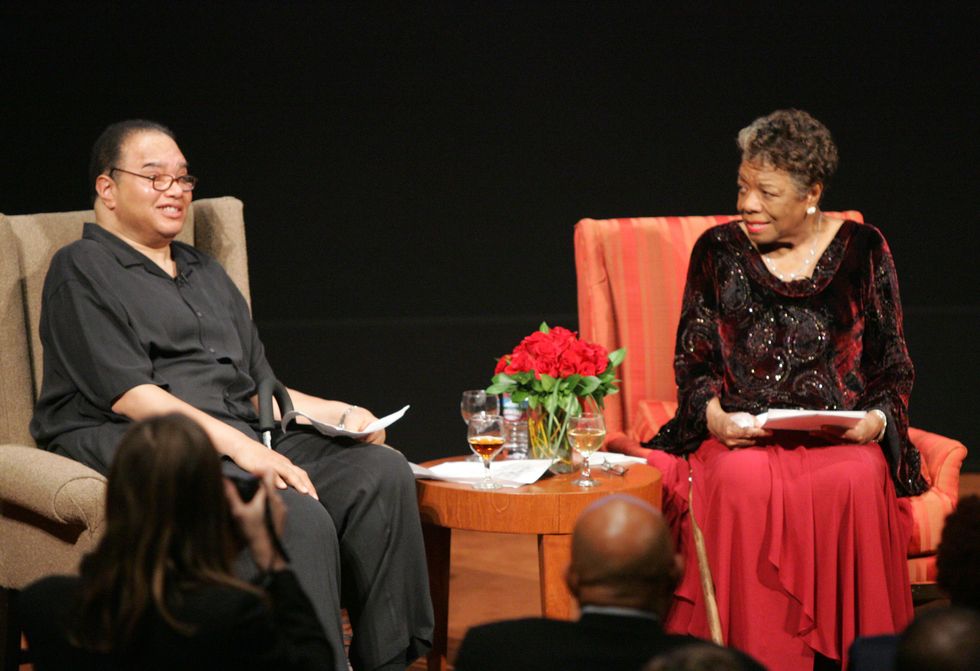
In 1944, Angelou gave birth to her son, Clyde Johnson, when she was 16 years old. Johnson followed in his mother’s footsteps to eventually become a poet known as Guy Johnson. He died in February 2022.
Angelou was often tight-lipped about her personal life, and details of her marriages and relationships have been inconsistent—even based on her own accounts. She is believed to have been married at least three times.
According to the National Women’s History Museum , Angelou wed Tosh Angelos, an electrician in the U.S. Navy, in 1949. She adopted a version of his surname and kept it through the rest of her life, despite the couple’s divorce in 1952.
In late 1960, Angelou met Vusumzi Make, a South African freedom fighter. The couple married in 1961, according to Stanford University’s Martin Luther King, Jr. Research and Education Institute . They moved to Cairo with her son in 1962, but the marriage dissolved soon after.
Then in 1973, Angelou married carpenter Paul du Feu and lived with him in Berkeley, California, until their divorce in 1981.
After experiencing health issues for a number of years, Angelou died on May 28, 2014, at her home in Winston-Salem, North Carolina. She was 86 years old. A specific cause of death wasn’t given, but Angelou’s literary agent, Helen Brann, said that she had been “frail” and suffering from heart problems.
The news of her passing spread quickly with many people taking to social media to mourn and remember Angelou. Singer Mary J. Blige and politician Cory Booker were among those who tweeted their favorite quotes by her in tribute.
Then-President Barack Obama also issued a statement about Angelou, calling her “a brilliant writer, a fierce friend, and a truly phenomenal woman.” Angelou “had the ability to remind us that we are all God’s children; that we all have something to offer,” he wrote.
A memorial service for Angelou was held on June 7, 2014, at Wake Forest University, where she taught for about three decades. Among the attendees were her close friend Oprah Winfrey , former President Bill Clinton , then-First Lady Michelle Obama , and actor Cicely Tyson . BeBe Winans and Lee Ann Womack gave musical performances.
In November 2020, the San Francisco Arts Commission unanimously approved the recommendation for a sculpture honoring Angelou “in recognition of her many accomplishments, including breaking the color and gender barriers by becoming San Francisco’s first African-American female streetcar conductor, an award-winning author and poet, a Presidential Medal of Freedom recipient and a civil rights leader.”
The monument is in development by artist Lava Thomas and scheduled to be installed in fall 2024 outside the main branch of the San Francisco Library. The design is a book featuring Angelou’s likeness on one side and the title of her famous poem “Still I Rise” at the base.
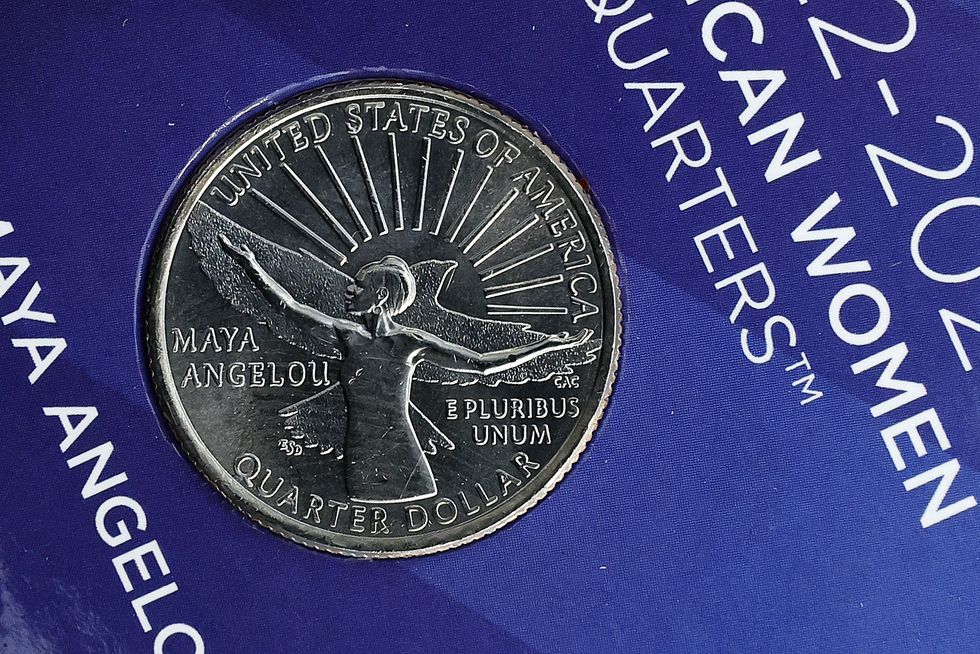
Meanwhile, Angelou has become one of the historical figures featured on U.S. money . It was announced in May 2021 that she would be one of the first women commemorated with a new series of quarters from the U.S. Mint. The first shipments of the coin were made in January 2022.
The obverse, or heads, side of the coin depicts former President George Washington , with the reverse side showing Angelou with her arms uplifted. The bird in flight and rising sun behind her likeness are images inspired by her poetry and symbolic of the way she lived, according to the U.S. Mint .
The American Women Quarters Program has honored nine other women from 2022 through 2023, including astronaut Sally Ride , former Cherokee Nation chief Wilma Mankiller , former First Lady Eleanor Roosevelt , and aviator Bessie Coleman . It is scheduled to continue through 2025.
- Courage is the most important of all virtues, because without courage, you cannot practice any of the other virtues consistently.
- I have found that among its other benefits, giving liberates the soul of the giver.
- The caged bird sings with a fearful trill / of things unknown but longed for still / and his tune is heard on the distant hill / for the caged birds sings of freedom.
- If you don’t like something, change it. If you can’t change it, change your attitude.
- We may encounter many defeats, but we must not be defeated.
- I’ve learned that people will forget what you said, people will forget what you did, but people will never forget how you made them feel.
- Words mean more than what is set down on paper. It takes the human voice to infuse them with deeper meaning.
- How important it is for us to recognize and celebrate our heroes and she-roes!
- To grow up is to stop putting blame on parents.
- We are only as blind as we want to be.
- The intensity with which young people live demands that they “black out” as often as possible.
- Home is a refuge, not only from my worries, my terrible concerns. I like beautiful things around me. I like to be beautiful because it delights my eyes and my soul is lifted up.
- You may not control the events that happen to you, but you can decide not to be reduced by them.
- When people show you who they are, believe them the first time.
- Let gratitude be the pillow upon which you kneel to say your nightly prayer. And let faith be the bridge you build to overcome evil and welcome good.
- If you get, give. If you learn, teach.
- In the flush of love’s light, we dare to be brave, and suddenly we see that love costs all we are and will ever be. Yet, it is only love which sets us free.
- I believe that each of us comes from the creator trailing wisps of glory.
Fact Check: We strive for accuracy and fairness. If you see something that doesn’t look right, contact us !
The Biography.com staff is a team of people-obsessed and news-hungry editors with decades of collective experience. We have worked as daily newspaper reporters, major national magazine editors, and as editors-in-chief of regional media publications. Among our ranks are book authors and award-winning journalists. Our staff also works with freelance writers, researchers, and other contributors to produce the smart, compelling profiles and articles you see on our site. To meet the team, visit our About Us page: https://www.biography.com/about/a43602329/about-us
Tyler Piccotti first joined the Biography.com staff as an Associate News Editor in February 2023, and before that worked almost eight years as a newspaper reporter and copy editor. He is a graduate of Syracuse University. When he's not writing and researching his next story, you can find him at the nearest amusement park, catching the latest movie, or cheering on his favorite sports teams.
Watch Next .css-16toot1:after{background-color:#262626;color:#fff;margin-left:1.8rem;margin-top:1.25rem;width:1.5rem;height:0.063rem;content:'';display:-webkit-box;display:-webkit-flex;display:-ms-flexbox;display:flex;}

Women’s History

Simone Biles

Kamala Harris
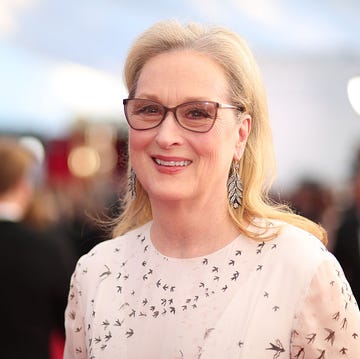
A Meryl Streep Quiz for Her Biggest Fans

What Is Vice President Kamala Harris’ Religion?

Marsha P. Johnson

Deb Haaland
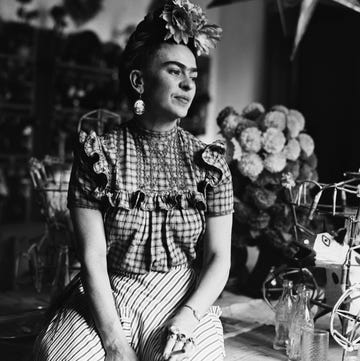
14 Hispanic Women Who Have Made History

5 Crowning Achievements of Maya Angelou
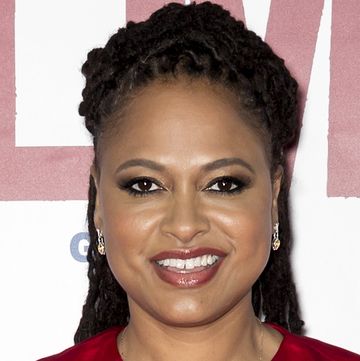
Ava DuVernay
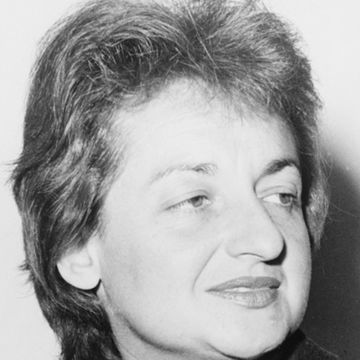
Betty Friedan
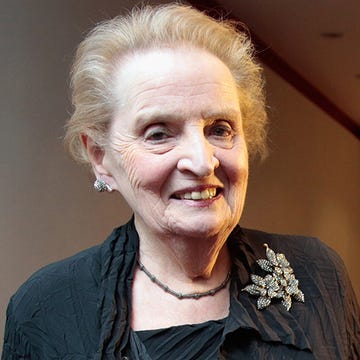
Madeleine Albright

Maya Angelou
An adaptation of the poem by Paul Lawrence "We Wear the Mask"
We Wear the Mask
We wear the mask that grins and lies, It shades our cheeks and hides our eyes— This debt we pay to human guile; With torn and bleeding hearts we smile, And mouth with myriad subtleties.
Why should that world be overwise, In counting all our tears and sighs? Nay, let them only see us, while We wear the mask.
We smile, but, oh my God, our cries To Thee from tortured souls arise. We sing, but oh, the clay is vile Beneath our feet, and long the mile; But let the world think otherwise, We wear the mask.
#AmericanWriters

Liked or faved by...

Other works by Maya Angelou...
Your skin like dawn Mine like musk One paints the beginning of a certain end. The other, the end of a
When love is a shimmering curtain Before a door of chance That leads to a world in question Wherein the macabrous dance Of bones that rattle in silence

I note the obvious differences in the human family. Some of us are serious, some thrive on comedy. Some declare their lives are lived

Soft grey ghosts crawl up my sleev… to peer into my eyes while I within deny their threats and answer them with lies. Mushlike memories perform
We were entwined in red rings Of blood and loneliness before The first snows fell Before muddy rivers seeded clouds Above a virgin forest, and

Give me your hand Make room for me to lead and follow you beyond this rage of poetry.
I keep on drying again. Veins collapse, opening like the Small fists of sleeping Children. Memory of old tombs,
I’ve got the children to tend The clothes to mend The floor to mop The food to shop Then the chicken to fry

She came home running back to the mothering blackness deep in the smothering blackness white tears icicle gold plains of… She came home running
A Rock, A River, A Tree Hosts to species long since depart… Marked the mastodon, The dinosaur, who left dried token… Of their sojourn here
One innocent spring your voice meant to me less than tires turning on a distant street. Your name, perhaps spoken,
He bad O he bad He make a honky poot. Make it honky’s blue eyes squint
There is no warning rattle at the… nor heavy feet to stomp the foyer… Safe in the dark prison, I know t… light slides over the fingered work of a toothless
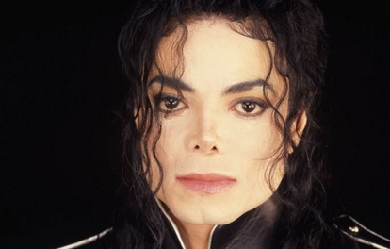
Beloveds, now we know that we know… Without notice, our dear love can… In the instant that Michael is go… Though we are many, each of us is… Only when we confess our confusion…

The sun has come. The mist has gone. We see in the distance... our long way home. I was always yours to have.

10 of the Best Maya Angelou Poems Everyone Should Read
By Dr Oliver Tearle (Loughborough University)
Maya Angelou (1928-2014) was not just a poet, of course: she was an influential civil rights campaigner in the United States, and her autobiography, I Know Why The Caged Bird Sings , is a classic of the genre. But several of her poems are well-known, and she was popular as a poet during her lifetime and a couple of the poems that follow, at the very least, remain famous.
Below, we’ve picked some of Maya Angelou’s very best poems, as a ‘way in’ to her work.
‘ Still I Rise ’.
This wonderfully self-assertive poem about picking yourself up and striving to achieve, even in the face of adversity, was used for an advertising campaign by the UNCF in the US, but its message of selfhood and determination is one that should be heard by all.
A kind of protest poem which is defiant as well as celebratory, ‘Still I Rise’ is about the power of the human spirit to overcome discrimination and hardship, with Angelou specifically reflecting her attitudes as a black American woman. Maya Angelou’s work, both her poetry and her autobiographies, is about the importance of not being defeated by the obstacles and challenges life throws at you.
When ‘you’ here denotes an African-American woman who grew up with more than her fair share of hardship, the message of her poems becomes even more rousing: Angelou had known what it was to struggle. It’s the perfect place to begin exploring Angelou’s poetry – and the ideal poem to head our selection of her must-read poems.
‘ Phenomenal Woman ’.
Being a ‘phenomenal woman’ is not about being a certain size, or a particular shape. It’s about how you carry yourself, and how you behave. As with several other poems on this list of Maya Angelou poems, ‘Phenomenal Woman’ is about being unbowed, about holding one’s head high and being proud of who one is.
‘ Caged Bird ’.
This poem, contrasting the free bird with the caged bird, perhaps owes a debt to William Blake: Angelou’s reference to a ‘bird that stalks / down his narrow cage / can seldom see through / his bars of rage’ evokes Blake’s famous couplet ‘A Robin Redbreast in a Cage / Puts all Heaven in a Rage.’
But the more immediate link is with Angelou’s own work, and her 1969 autobiography I Know Why the Caged Bird Sings . The free bird has no need of song, but the caged bird sings because it is not free.
There are obvious parallels here between African American women in the United States and white American women, but Angelou does not reduce her poem to such a straightforward equivalence. Instead, it can be read as a poem about freedom and isolation in more general terms (although personally we think it benefits from having its specific context borne in mind).
‘ On the Pulse of Morning ’.
This earns its place on our list of Maya Angelou’s best poems because of its historic importance as much as its literary merits (the poem received mixed reviews from critics): Angelou recited this poem at the inauguration of US President Bill Clinton in January 1993.
This made Angelou only the second poet ever to read a poem at a presidential inauguration (the first had been Robert Frost at John F. Kennedy’s inauguration in 1961) and the first woman to do so (and the first African American).
‘ Equality ’.
Here we have another Angelou poem in which the individual speaker represents all African-American people. In this rousing poem which addresses racial discrimination, Angelou equates the struggle for equality – specifically, racial equality – with the struggle for freedom.
The poem concludes with the image of an insistent drumbeat which marks the rhythm of social change which the speaker and others involved in civil rights have established.
‘ The Mothering Blackness ’.
This is a poem about returning home. The subject of the poem is a girl who goes home to her mother’s arms, afraid and ‘creeping’ because she fears she is in trouble.
Yet Angelou tells us that the girl in the poem is ‘blameless’, inviting us to read the poem as about ‘mothers’ and ‘daughters’ in a wider sense: it is about the generational shift between African-American women of Angelou’s mother’s age, and those of Angelou’s own generation.
‘ Woman Work ’.
Many of Maya Angelou’s best-known poems focus on the plight of women, and specifically Black women. Another important strand to her work is work itself: a focus on the daily menial tasks which many wives and mothers have to carry out around the home as part of their domestic duties.
This poem is perhaps the best example of this theme in Angelou’s poetry. The speaker is such a woman, who nevertheless finds something to call her ‘own’ when she looks to the sun, the rain, the oceans, and the mountains: nature’s bounty.
‘ Harlem Hopscotch ’.
Here’s another poem in which racial inequality is tied to freedom, although poverty is another salient theme of the poem. The references to food being gone and rent being due suggest that life is a constant struggle for the Black Americans depicted in the poem, which takes its title from a prominent African-American district in New York.
‘ These Yet to Be United States ’.
Playing on the name of her home country, Angelou invites us to reflect on the divisive nature of the ‘United’ States of America – a country in which racial and socio-economic divisions loom large.
Angelou refers to some of the great ‘achievements’ of America, from the Telstar satellite to the atomic bomb. Can a country capable of such technological inventions not also heal itself of its social division?
‘ Life Doesn’t Frighten Me ’.
A poem about overcoming fear and not allowing it to master you, ‘Life Doesn’t Frighten Me’ is the perfect poem to conclude this pick of Maya Angelou’s best poems: a powerful declaration of self-belief and the importance of facing one’s fears.
Angelou lists a number of things, from barking dogs to grotesque fairy tales in the Mother Goose tradition, but comes back to her mantra: ‘Life doesn’t frighten me at all’. We’re especially fond of Angelou’s image of walking the ocean floor and never having to breathe.
Discover more from Interesting Literature
Subscribe to get the latest posts sent to your email.
Type your email…
1 thought on “10 of the Best Maya Angelou Poems Everyone Should Read”
- Pingback: 10 of the Most Accessible Poets in English Literature – Interesting Literature
Leave a Reply Cancel reply
Subscribe now to keep reading and get access to the full archive.
Continue reading
Poems & Poets

Maya Angelou: Selections
Poems by the iconic poet and civil rights leader.
BY The Editors

[Jump to poems by publication year: 1970s | 1980s | 1990s ]
Maya Angelou (1928–2014) had a broad and distinguished career both inside and outside the literary realm. She is most famous for her work as a poet, memoirist, and civil rights activist, working with Dr. Martin Luther King Jr. and Malcolm X. She also worked in entertainment as a singer, a dancer, an actor, and a director. Her poetry was inspired and informed by her life and work, and this personal connection made her poems profound and powerful. Over the course of a career spanning the 1960s to her death in 2014, she captured, provoked, inspired, and ultimately transformed American people and culture. The following eight poems—presented chronologically from her earliest publication to the public poem she read at President Bill Clinton’s first inauguration—showcase Angelou’s poetics.
Maya Angelou’s selected poems in order of publication
“The Mothering Blackness” (1971)
She came home running back to the mothering blackness
With a firm root in African American history, many of Angelou’s poems, such as this one, can be traced to the work songs slaves sang. The repeating lines give the sense of a refrain, and varying line lengths and numbers of syllables give an improvised feel. Songs passed down orally, such as work songs, are often narratives: this poem tells the story of a girl running back to “the mothering blackness.” The regularly indented lines also give the impression that at least two voices are speaking, which would have been the case in work songs that were almost always sung by a collective.
“Kin” (1978)
You fought to die, thinking In destruction lies the seed Of birth. You may be right.
Angelou has written that when she uses the pronoun I , she is referring to a collective we . In “Kin,” it’s clear to see that her narrator speaks for a larger human experience. The poem, which is dedicated to her brother, is a dramatic monologue with short, unrhymed lines. It takes familial closeness as its theme, with the shared memories and shared suffering that come with being part of a group. The narrator also associates herself with three powerful females in human history and, in doing so, speaks to and for the people.
“Phenomenal Woman” (1978)
I’m a woman Phenomenally. Phenomenal woman, That’s me.
The title of a collection and one of Angelou’s most famous poems, “Phenomenal Woman” celebrates black beauty and female strength. It’s a poem of power: when the narrator walks into a room, “The fellows stand or / Fall down on their knees.” This poem, with its expanding lines wrapped around a two-word refrain, suggests that the woman’s physical presence—her hips, step, eyes, teeth, waist, and feet—makes her powerful but also commends her “inner mystery.” Written in the 1970s toward the end of the Black Arts Movement , this celebration of black beauty confronts traditional white structures of “fashion models” and “pretty women” and replaces them with the confident narrator of “Phenomenal Woman.”
“California Prodigal” (1978)
...Audacious Sunlight casts defiance At their feet.
How does one inspire change in the face of stunning indifference? “Agile poppies” face off against “old manors” as the tension between the apathy of history and the vitality of the human spirit is explored. Even Angelou’s language takes part, shifting from her usual everyday speech to Latinate words such as fulminant , antiquitous , gelid , and the made-up word phantasmatalities . By presenting a battle between the sun and the mountains, this struggle becomes silent and daily, much like the day-to-day conflicts that Civil Rights activists encountered. The final image—a sun at the base of a mountain—is hopeful, suggesting that the sun will continue to rise, at least until it goes down for the day and the battle begins again.
“A Plagued Journey” (1983)
Through all the bright hours I cling to expectation
The theme of struggle and submission reoccurs throughout Angelou’s poetry, here without exception. This narrator is utterly passive, even in the face of the personified Hope. Eventually a personified Gloom “sucks the strands” of the speaker’s hair and “forgives [her] heady / fling with Hope.” Turning these abstract feelings into greedy and arrogant figures allows Angelou to portray the narrator’s helplessness to respond in any way besides submission.
“Caged Bird” (1983)
for the caged bird sings of freedom.
The caged bird serves as Angelou’s signature image, frequenting her most famous autobiography, I Know Why the Caged Bird Sings (1979). The image is not hers originally: it’s taken from Paul Laurence Dunbar , a popular early-20th-century African American writer and another of Angelou’s influences. This poem can be read in relation to “ Sympathy ,” in which Dunbar describes the caged bird, a symbol for a chained slave, beating his bruised and bloody wings. Angelou revises “Sympathy” by portraying a free bird beside a caged bird. Rhyme builds throughout the poem—the first stanza is unrhymed, and only two lines rhyme in the second, but the third (the chorus) features repeated “-ill” sounds mocking birdsong.
From “On the Pulse of Morning ” (1993)
The Rock cries out to us today, You may stand upon me, But do not hide your face.
When Angelou read this poem at President Clinton’s first inauguration, she became the second poet to read a poem at a presidential inauguration and the first woman and African American to do so. At this point in her career, she had achieved great success as a spokeswoman, a writer, and an activist. This poem depicts a country on the brink of change and insists “You … have crouched too long in / The bruising darkness / Have lain too long / Facedown in ignorance, / Your mouths spilling words / Armed for slaughter.” Angelou calls for peace, harmony, and social justice for all of the marginalized in this poem and during the rest of her remarkable career.
The editorial staff of the Poetry Foundation. See the Poetry Foundation staff list and editorial team masthead .
Biography of Maya Angelou
Maya Angelou was an American writer and civil rights activist. Angelou is best known for her many books of poetry and autobiographies, as well as her active participation in the Civil Rights Movement, which involved working with Martin Luther King Jr. and Malcolm X.
Born Marguerite Annie Johnson in St. Louis, Missouri, Angelou's parents' divorce resulted in Angelou and her brother being sent to Stamps, Arkansas to live with their paternal grandmother and uncle. A contrast with the city life of her early years, Angelou's childhood was passed in Stamps’ close-knit black neighborhood under her grandmother’s strict moral and religious guidance. In 1936, Angelou was sent back to St. Louis to live with her mother. When Angelou was eight years old, her mother’s boyfriend raped her, leading to a one-day jail sentence. Angelou’s uncles murdered the man upon his release, and Angelou's fear and guilt over naming her assailant led to nearly five years of muteness. Angelou was sent back to Arkansas once again, where she sheltered herself from the world and found comfort in reading classic literature and studying at school. In 1940, Angelou moved to San Francisco with her mother. At age 16, she became the first black streetcar conductor in San Francisco. One year later, she graduated from high school and subsequently gave birth to her only child. While her mother embraced her newborn grandson, Angelou had to work hard to support him. She worked intermittently as a dancer, cook, waitress, and sex worker. A brief marriage and a prominent position as a dancer in a San Francisco club inspired her professional name, Maya Angelou.
In the 1950s, Angelou moved to New York City. The Harlem Writer’s Guild encouraged her budding literary talent, and she performed in several theatrical productions around the world. In 1966, she moved back to California and wrote scripts for television and film. She became one of the first black female screenwriters and directors in Hollywood. She was also a friend to both Martin Luther King Jr. and Malcolm X, and she worked tirelessly for the Civil Rights Movement. Inspired by her encounters with authors and editors, she eventually decided to turn the anecdotes of her colorful life into autobiographies.
In 1969, her first published autobiographical work, I Know Why the Caged Bird Sings , became a bestseller. Six subsequent autobiographies followed this early success, as well as several volumes of poetry. Her many talents earned her award nominations and wins in multiple fields, from a Pulitzer Prize nomination for poetry to five Grammy awards for her spoken-word albums. In 1981, Angelou was appointed professor of American studies at Wake Forest University. She also received many honorary degrees from universities over the course of her life.
In 1993, Angelou was invited to read her poem " On the Pulse of Morning " at the inauguration of President Bill Clinton. In 2011, President Barack Obama awarded her the Presidential Medal of Freedom.
Maya Angelou died at her home in Winston-Salem, North Carolina on May 28th, 2014. Angelou continues to be revered as a woman of many talents who—through her artistic, academic, and humanitarian endeavors—shed light on the issues of family, racism, sexism, and economic oppression.

Study Guides on Works by Maya Angelou
Africa (maya angelou poem) maya angelou.
Maya Angelou’s “Africa” was originally published in 1975 in her second volume of poetry, Oh Pray My Wings Are Gonna Fit Me Well. At the time of its publication, Angelou had already established herself as a prolific writer of both prose and verse....
- Study Guide
Alone (Maya Angelou poem) Maya Angelou
Maya Angelou’s “Alone” was originally published in 1975 in her second volume of verse, Oh Pray My Wings Are Gonna Fit Me Well. By the time of the book’s publication, Angelou had already established herself as a prolific writer of both prose and...
Caged Bird Maya Angelou
Often interpreted as an allegory for the experience of oppressed Black Americans, Maya Angelou's "Caged Bird" is a poem that compares the experience of a captive bird to a bird who lives freely. While the free bird soars through the sky and thinks...
Harlem Hopscotch Maya Angelou
Harlem Hopscotch is a poem written and recorded by famed civil rights leader Dr. Maya Angelou in her spoken-word collection The Poetry of Maya Angelou ( 1969). The poem was later published in her anthology collection, Just Give Me a Cool Drink of...
The Heart of a Woman Maya Angelou
The Heart of a Woman (1981) by Maya Angelou is the fourth book in her series of seven autobiographies. The Heart of a Woman tells the tale of Angelou as she leaves the world of show biz behind and moves to New York to become a writer and join the...
I Know Why the Caged Bird Sings Maya Angelou
I Know Why the Caged Bird Sings is the first of seven volumes of Maya Angelou's autobiography, which cover the years from the early 1930's, up until about 1970. Out of the seven, it is probably the most popular and critically acclaimed volume,...
- Lesson Plan
Maya Angelou: Poems Maya Angelou
A poet and civil rights activist, Maya Angelou published a number of autobiographies, essay collections, and poetry collections. It is due to her unique ability to reach out to a large subset of Americans with her poetry and prose that she won...
On the Pulse of Morning Maya Angelou
"On the Pulse of Morning" is a poem written and performed by Maya Angelou as part of the presidential inauguration of Bill Clinton in 1993. The poem is a call to recognize America’s history of slavery and racism, as well as the catastrophic...
Phenomenal Woman (Maya Angelou poem) Maya Angelou
Maya Angelou’s “Phenomenal Woman” was originally published in 1978 in her third volume of poetry, And Still I Rise. The poem was also featured that same year in Cosmopolitan magazine. At the time of its publication, Angelou was already well known...
Still I Rise Maya Angelou
“Still I Rise” is one of Maya Angelou’s most celebrated poems. Originally published in 1978 in Angelou’s third volume of verse, And Still I Rise, it shares its title with a play she wrote in 1976 and was written during a highly prolific time in...
English Studies
This website is dedicated to English Literature, Literary Criticism, Literary Theory, English Language and its teaching and learning.
“Equality” by Maya Angelou: A Critical Analysis
Equality” by Maya Angelou was published in 1978 in her collection And Still I Rise.

Introduction: “Equality” by Maya Angelou
Table of Contents
Equality” by Maya Angelou was published in 1978 in her collection And Still I Rise . The poem uses powerful repetition and vivid imagery to convey the speaker’s unwavering determination in the fight for equality and freedom. Angelou uses metaphors like “blinders” and “padding” to represent societal barriers imposed upon the speaker, and emphasizes an enduring, rhythmic spirit with references to drums and a pulsing tempo. Her work doesn’t simply mention qualities and features, it embodies them.
Text: “Equality” by Maya Angelou
You declare you see me dimly through a glass which will not shine, though I stand before you boldly, trim in rank and marking time. You do own to hear me faintly as a whisper out of range, while my drums beat out the message and the rhythms never change. Equality, and I will be free. Equality, and I will be free. You announce my ways are wanton, that I fly from man to man, but if I’m just a shadow to you, could you ever understand ? We have lived a painful history, we know the shameful past, but I keep on marching forward, and you keep on coming last. Equality, and I will be free. Equality, and I will be free. Take the blinders from your vision, take the padding from your ears, and confess you’ve heard me crying, and admit you’ve seen my tears. Hear the tempo so compelling, hear the blood throb in my veins. Yes, my drums are beating nightly, and the rhythms never change. Equality, and I will be free. Equality, and I will be free.
Annotations: “Equality” by Maya Angelou
| 1 | * “Dimly through a glass,” “blinders,” and “padding” represent limitations and silencing by society. * The “drums” symbolize an unyielding drive for freedom, echoing a heartbeat that cannot be stifled. |
| 2 | * “The same hot blood,” “same cool breath” highlight the human commonality ignored by those who seek to oppress. * Switch from questioning to assertive declarations like “Equality… is the beat of my heart.” |
| 3 | * Angelou refuses to be “dried up” and “bowed,” a powerful refusal to submit to oppression. * “Yes, my rhythm…my heart” emphasizes the enduring spirit and claim to equality. |
| 4 | * “Rising sun” symbolizes hope, while “tide” represents the unstoppable force of change. * Emphasized by the repeated “You may…but you cannot” structure, showing the impossibility of breaking the speaker’s will. |
Literary And Poetic Devices: “Equality” by Maya Angelou
| Implied comparison between dissimilar things | “You declare you see me dimly / Through a glass…” | |
| Direct comparison using “like” or “as” | “…beat like a drum” | |
| Repeating words or phrases for emphasis | “You may trod me…”, “And still like dust…”, “Equality, and I will be free” | |
| Repetition of a word or phrase at the start of lines | “You may write me down…”, “You may trod me…”, “You may shoot me…” | |
| Vivid language appealing to the senses | “cool breath,” “the tide that rushes in” | |
| Giving human attributes to non-human things | “…drums of my heart…” | |
| Using objects/concepts to represent deeper meaning | The sun as a symbol of hope and renewal | |
| Repetition of consonant sounds at word beginnings | “cut me with your cruel words” | |
| Repetition of vowel sounds within words | “hot blood,” “cool breath” | |
| Line breaks mid-sentence, creating flow | “And still like dust, I’ll rise” | |
| Strong pauses within a line of poetry | “Equality – and I will be free.” (the dash) | |
| Reference to a historical person, event, etc. | Possible Biblical allusions in the phrasing and determination | |
| Contrast between two elements for effect | “hot blood” versus “cool breath” highlighting shared humanity | |
| Repetition of end sounds in words | Not heavily used, but some internal rhyme: “sun”/”done” | |
| The pattern of stressed/unstressed syllables | Strong, insistent rhythm throughout, like the “drums” |
Themes: “Equality” by Maya Angelou
- Theme 1: Resilience The speaker’s unwavering spirit in the face of oppression is a powerful theme. They’ve been subjected to attempts to diminish and silence them (“you declare you see me dimly”) but their strength shines through. The repeated phrase “And still, like dust, I’ll rise” highlights that no matter how they are treated, their spirit remains unbroken.
- Theme 2: Inherent Human Equality Angelou challenges the very foundation of oppression by highlighting the shared humanity between the speaker and those who would seek to dominate them. The lines “the same hot blood,” and “the same cool breath” emphasize that the speaker is fundamentally equal to those who treat them unjustly.
- Theme 3: Defiance Against Oppression This poem stands as a defiant call against all forms of oppression. The speaker boldly proclaims “Equality – and I will be free” challenging the power of their oppressors. The repeated phrase “You may… but still” (as in “You may shoot me with your words… but still, like air, I’ll rise.”) highlights their refusal to be subdued.
- Theme 4: Inevitability of Change Angelou cleverly uses natural imagery to convey the inevitability of social change and the pursuit of justice. The rising sun is a recurring image of hope and new beginnings, while the reference to “the tide that rushes in” paints the fight for equality as a natural and unstoppable force.
Literary Theories and “Equality” by Maya Angelou
| Examines gender roles, power dynamics, female voice | “Equality” challenges patriarchal structures and gives voice to a marginalized woman defying society’s expectations of submission. | |
| Explores race, power, and social constructs | The poem can be read as an act of resistance against systemic racism; Angelou highlights universal humanity despite racial oppression. | |
| How colonialism impacts identity and power | Even without direct colonial references, the poem speaks to the legacy of oppression and a colonized mindset imposed by those in power. | |
| Emphasizes the reader’s role in meaning-making | This poem is intended to inspire strength and solidarity, making the reader’s individual experience and feelings central to its power. | |
| Text analyzed within historical context | Published in 1978, the poem gains added power amidst the Civil Rights era and second-wave feminism, reflecting the struggles of its time |
Critical Questions about “Equality” by Maya Angelou
1. How does Angelou use the drumming imagery to establish both the speaker’s internal rhythm and connection to a greater movement?
- “Now you understand / Just why my head’s not bowed. / I don’t shout or jump about / Or have to talk real loud. / When you see me passing, / It ought to make you proud.”
- Analysis: The drumbeat can represent the indomitable spirit within the speaker, and likely connects to broader traditions of African and African-American music as expressions of resistance and community.
2. How does the shift in tone, from questioning to assertive, reflect the speaker’s journey toward empowerment?
- “You may trod me in the very dirt / But still, like dust, I’ll rise.”
- Analysis: Early stanzas pose questions, reflecting doubt and uncertainty. Yet, the declarations of the later stanzas show a shift toward an unwavering belief in inevitable equality.
3. How does the speaker’s connection to nature undermine the oppressor’s attempts to diminish them?
- “Does my sassiness upset you? / Why are you beset with gloom? / ’Cause I walk like I’ve got oil wells / Pumping in my living room.”
- Analysis: Natural imagery (sun, tide) portrays forces beyond human control. This links the drive for equality to something unstoppable, making attempts at control seem futile.
4. Could this poem be interpreted as a call to action, and if so, what kind of action is encouraged?
- “Equality, and I will be free.”
- Analysis: The poem doesn’t outline practical steps, but stirs a defiant spirit. Is this about inner strength, collective action, or something else entirely?
Literary Works Similar to “Equality” by Maya Angelou
- “Still I Rise” by Maya Angelou: Shares themes of perseverance and defiance against oppression, similar tone of unwavering determination.
- “Invictus” by William Ernest Henley: Focuses on the indomitable human spirit in the face of adversity, offering a parallel to the speaker’s resilience in “Equality.”
- “Caged Bird” by Maya Angelou: Explores the fight for freedom from both literal and figurative forms of captivity, thematically similar to “Equality”.
- “I, Too” by Langston Hughes: Asserts the speaker’s place in American society, mirroring “Equality’s” demand for recognition of inherent equality.
- Narrative of the Life of Frederick Douglass, an American Slave by Frederick Douglass: Autobiographical account of a fight for freedom from slavery; directly highlights systemic oppression that “Equality” also addresses.
- “ Letter from Birmingham Jail ” by Martin Luther King Jr.: A powerful argument for social justice and call to action, similar to the implicit challenge in “Equality” against complacency.
- “Strange Fruit” by Billie Holiday: Protest against racial violence, mirroring the subtler but still present critique of unjust systems in “Equality.”
- “A Change Is Gonna Come” by Sam Cooke: Civil Rights era anthem embodying hope and the inevitability of change, similar to the thematic undercurrent in “Equality.”
Suggested Readings: “Equality” by Maya Angelou
Scholarly monographs:.
- Braxton, Joanne M. Maya Angelou’s I Know Why the Caged Bird Sings: A Casebook . Oxford University Press, 1999. (Provides in-depth analysis of Angelou’s work, often including attention to her poetry and the recurring themes relevant to understanding “Equality”.)
- Gillespie, Marcia Ann, et al. Maya Angelou: A Glorious Celebration . Doubleday, 2008. (While focused on Angelou’s life, this work likely offers contextual details and insights that could shed further light on the motivations and themes present in “Equality”.)
Peer-Reviewed Journal Articles:
- McWhorter, John. “Saint Maya.” The New Republic , vol. 219, no. 11, 1998, pp. 35-41. (Offers a critical, sometimes contrarian perspective on Angelou’s legacy, inviting a multifaceted understanding of how readers engage with “Equality”.)
- Neubauer, Paul. “Maya Angelou: Poetic Witness.” The Missouri Review , vol. 31, no. 3, 2008, pp. 77-95. JSTOR, www.jstor.org/stable/20712891. (Focuses specifically on Angelou’s poetic techniques, providing tools for close reading and deeper analysis of “Equality.”)
Reputable Websites:
- Poetry Foundation: Maya Angelou. https://www.poetryfoundation.org/poets/ maya-angelou (Offers biographical information, access to Angelou’s poems, and may include critical essays or resources relevant to specific poems, including “Equality.”)
- The Academy of American Poets: Maya Angelou. https://poets.org/poet/maya-angelou (Similar to the Poetry Foundation, providing a starting place for research and potential critical analyses.)

Related posts:
- “The Darkling Thrush” by Thomas Hardy: Analysis
- “The Lady of Shalott” by Lord Tennyson: Analysis
- “Yet Do I Marvel” by Countee Cullen: Analysis
- “Terminus” by Ralph Waldo Emerson: Analysis
Leave a Reply Cancel reply
Your email address will not be published. Required fields are marked *
Save my name, email, and website in this browser for the next time I comment.

- Ask LitCharts AI
- Discussion Question Generator
- Essay Prompt Generator
- Quiz Question Generator

- Literature Guides
- Poetry Guides
- Shakespeare Translations
- Literary Terms
Life Doesn't Frighten Me Summary & Analysis by Maya Angelou
- Line-by-Line Explanation & Analysis
- Poetic Devices
- Vocabulary & References
- Form, Meter, & Rhyme Scheme
- Line-by-Line Explanations
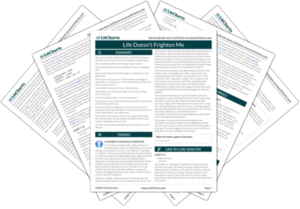
The American poet Maya Angelou's "Life Doesn't Frighten Me" was first published as a picture book (illustrated by the painter Jean-Michel Basquiat) in 1993. In this poem, a little girl claims that she's not the least bit frightened of—well, anything, from "panthers" to "tough guys." While her list of the things she's not frightened of might hint she's actually a little more scared than she's letting on, her bravado makes it clear that she has the courage to face her fears. This poem suggests that it takes real and admirable bravery to be a kid.
- Read the full text of “Life Doesn't Frighten Me”
| LitCharts |
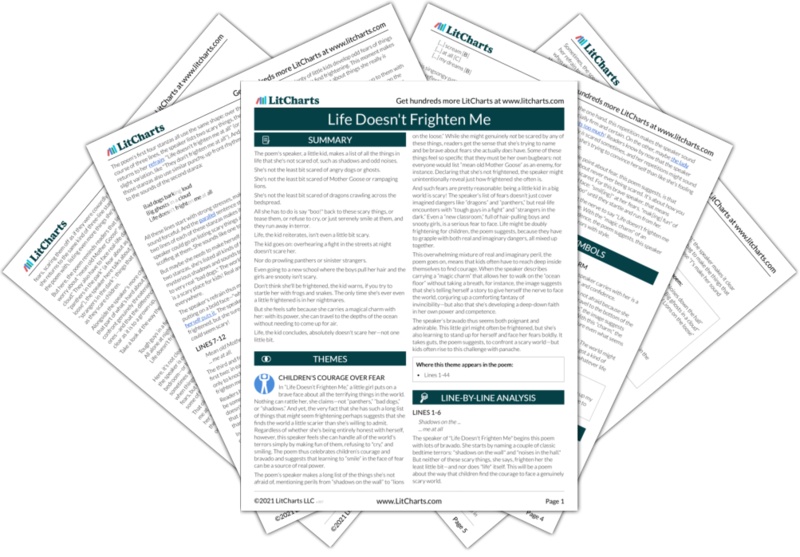
The Full Text of “Life Doesn't Frighten Me”
“life doesn't frighten me” summary, “life doesn't frighten me” themes.

Children's Courage Over Fear
Line-by-line explanation & analysis of “life doesn't frighten me”.
Shadows on the ... ... me at all

Mean old Mother ... ... me at all.
Lines 13-21
I go boo ... ... me at all.
Lines 22-27
Tough guys in ... ... me at all.
Lines 28-32
That new classroom ... ... me at all.
Lines 33-36
Don't show me ... ... in my dreams.
Lines 37-40
I've got a ... ... have to breathe.
Lines 41-44
Life doesn't frighten ... ... me at all.
“Life Doesn't Frighten Me” Symbols

The Magic Charm
- Lines 37-40: “I've got a magic charm / That I keep up my sleeve, / I can walk the ocean floor / And never have to breathe.”
“Life Doesn't Frighten Me” Poetic Devices & Figurative Language
- Line 3: “Life doesn't frighten me at all”
- Line 6: “Life doesn't frighten me at all”
- Line 9: “They don't frighten me at all”
- Line 12: “That doesn't frighten me at all.”
- Line 21: “Life doesn't frighten me at all.”
- Line 24: “Life doesn't frighten me at all.”
- Line 27: “No, they don't frighten me at all.”
- Line 32: “They don't frighten me at all.”
- Line 41: “Life doesn't frighten me at all”
- Line 44: “Life doesn't frighten me at all.”
Parallelism
- Lines 1-2: “Shadows on the wall / Noises down the hall”
- Lines 4-5: “Bad dogs barking loud / Big ghosts in a cloud”
- Lines 7-8: “Mean old Mother Goose / Lions on the loose”
- Line 10: “Dragons breathing flame”
- Line 13: “I go boo”
- Line 15: “I make fun”
- Line 17: “I won't cry”
- Line 19: “I just smile”
- Line 22: “Tough guys in a fight”
- Lines 25-26: “Panthers in the park / Strangers in the dark”
- Line 28: “That new classroom where”
- Line 30: “Kissy little girls”
- Lines 42-43: “Not at all / Not at all.”
End-Stopped Line
- Line 1: “wall”
- Line 2: “hall”
- Line 3: “all”
- Line 4: “loud”
- Line 5: “cloud”
- Line 6: “all”
- Line 7: “Goose”
- Line 8: “loose”
- Line 9: “all”
- Line 12: “all.”
- Line 13: “boo”
- Line 14: “shoo”
- Line 15: “fun”
- Line 16: “run”
- Line 17: “cry”
- Line 18: “fly”
- Line 19: “smile”
- Line 20: “wild”
- Line 21: “all.”
- Line 22: “fight”
- Line 23: “night”
- Line 24: “all.”
- Line 25: “park”
- Line 26: “dark”
- Line 27: “all.”
- Line 29: “hair”
- Line 31: “curls”
- Line 32: “all.”
- Line 34: “scream”
- Line 36: “dreams.”
- Line 38: “sleeve,”
- Line 40: “breathe.”
- Line 41: “all”
- Line 42: “all”
- Line 43: “all.”
- Line 44: “all.”
Colloquialism
- Line 7: “Mean old Mother Goose”
- Lines 13-20: “I go boo / Make them shoo / I make fun / Way they run / I won't cry / So they fly / I just smile / They go wild”
- Lines 28-31: “That new classroom where / Boys pull all my hair / (Kissy little girls / With their hair in curls)”
Alliteration
- Line 4: “Bad,” “barking”
- Line 5: “Big”
- Line 7: “Mean,” “Mother”
- Line 8: “Lions,” “loose”
- Line 25: “Panthers,” “park”
“Life Doesn't Frighten Me” Vocabulary
Select any word below to get its definition in the context of the poem. The words are listed in the order in which they appear in the poem.
- Counterpane
- Kissy little girls
- (Location in poem: Lines 10-11: “Dragons breathing flame / On my counterpane”)
Form, Meter, & Rhyme Scheme of “Life Doesn't Frighten Me”
Rhyme scheme, “life doesn't frighten me” speaker, “life doesn't frighten me” setting, literary and historical context of “life doesn't frighten me”, more “life doesn't frighten me” resources, external resources.
The Poem as a Picture Book — See images from the poem in its original form as a picture book illustrated by the artist Jean-Michel Basquiat.
Maya Angelou's Website — Visit Angelou's website to learn more about her life and legacy.
The Poem Aloud — Listen to Angelou herself performing the poem.
An Interview with Angelou — Watch a 1993 interview with Maya Angelou.
Angelou's Obituary — Read Angelou's obituary to learn more about her life and her influence.
LitCharts on Other Poems by Maya Angelou
Country Lover
Harlem Hopscotch
On the Pulse of Morning
Phenomenal Woman
Still I Rise
When Great Trees Fall
Ask LitCharts AI: The answer to your questions

- Quizzes, saving guides, requests, plus so much more.
Maya Angelou on Identity and the Meaning of Life
By maria popova.

Reflecting on her life, Angelou — who rose to cultural prominence through the sheer tenacity of her character and talent, despite being born into a tumultuous working-class family, abandoned by her father at the age of three, and raped at the age of eight — tells Rich:
I’ve been very fortunate… I seem to have a kind of blinkers. I just do not allow too many negatives to soil me. I’m very blessed. I have looked quite strange in most of the places I have lived in my life, the stages, spaces I’ve moved through. I of course grew up with my grandmother: my grandmother’s people and my brother are very very black, very lovely. And my mother’s people were very very fair. I was always sort of in between. I was too tall. My voice was too heavy. My attitude was too arrogant — or tenderhearted. So if I had accepted what people told me I looked like as a negative yes, then I would be dead. But I accepted it and I thought, well, aren’t I the lucky one.

She later revisits the question of identity, echoing Leo Buscaglia’s beautiful meditation on labels , as she reflects on the visibility her success granted her and the responsibility that comes with it:
What I represent in fact, what I’m trying like hell to represent every time I go into that hotel room, is myself. That’s what I’m trying to do. And I miss most of the time on that: I do not represent blacks or tall women, or women or Sonomans or Californians or Americans. Or rather I hope I do, because I am all those things. But that is not all that I am. I am all of that and more and less. People often put labels on people so they don’t have to deal with the physical fact of those people. It’s easy to say, oh, that’s a honkie, that’s a Jew, that’s a junkie, or that’s a broad, or that’s a stud, or that’s a dude. So you don’t have to think: does this person long for Christmas? Is he afraid that the Easter bunny will become polluted? … I refuse that… I simply refuse to have my life narrowed and proscribed.
To be sure, beneath Angelou’s remarkable optimism and dignity lies the strenuous reality she had to overcome. Reflecting on her youth, she channels an experience all too familiar to those who enter life from a foundation the opposite of privilege:
It’s very hard to be young and curious and almost egomaniacally concerned with one’s intelligence and to have no education at all and no direction and no doors to be open… To go figuratively to a door and find there’s no doorknob.
And yet Angelou acknowledges with great gratitude the kindness of those who opened doors for her in her spiritual and creative journey. Remembering the Jewish rabbi who offered her guidance in faith and philosophy and who showed up at her hospital bedside many years later after a serious operation, Angelou tells Rich:
The kindnesses … I never forget them. And so they keep one from becoming bitter. They encourage you to be as strong, as volatile as necessary to make a well world. Those people who gave me so much, and still give me so much, have a passion about them. And they encourage the passion in me. I’m very blessed that I have a healthy temper. I can become quite angry and burning in anger, but I have never been bitter. Bitterness is a corrosive, terrible acid. It just eats you and makes you sick.

At the end of the interview, Angelou reflects on the meaning of life — a meditation all the more poignant as we consider, in the wake of her death, how beautifully she embodied the wisdom of her own words:
I’ve always had the feeling that life loves the liver of it. You must live and life will be good to you, give you experiences. They may not all be that pleasant, but nobody promised you a rose garden. But more than likely if you do dare, what you get are the marvelous returns. Courage is probably the most important of the virtues, because without courage you cannot practice any of the other virtues, you can’t say against a murderous society, I oppose your murdering. You got to have courage to do so. I seem to have known that a long time and found great joy in it.
The totality of Conversations with Maya Angelou is a powerful portal into the beloved writer’s soul. Complement it with Angelou on home, belonging, and (not) growing up , her children’s verses about courage illustrated by Basquiat , and her breathtaking reading of “Phenomenal Woman.”
— Published May 29, 2014 — https://www.themarginalian.org/2014/05/29/maya-angelou-on-identity-and-the-meaning-of-life/ —

www.themarginalian.org

PRINT ARTICLE
Email article, filed under, books culture interview maya angelou psychology, view full site.
The Marginalian participates in the Bookshop.org and Amazon.com affiliate programs, designed to provide a means for sites to earn commissions by linking to books. In more human terms, this means that whenever you buy a book from a link here, I receive a small percentage of its price, which goes straight back into my own colossal biblioexpenses. Privacy policy . (TLDR: You're safe — there are no nefarious "third parties" lurking on my watch or shedding crumbs of the "cookies" the rest of the internet uses.)
On What Would Have Been Maya Angelou's 94th Birthday, We Honor Her Literary Legacy
Here are 10 must-read books by the iconic author.
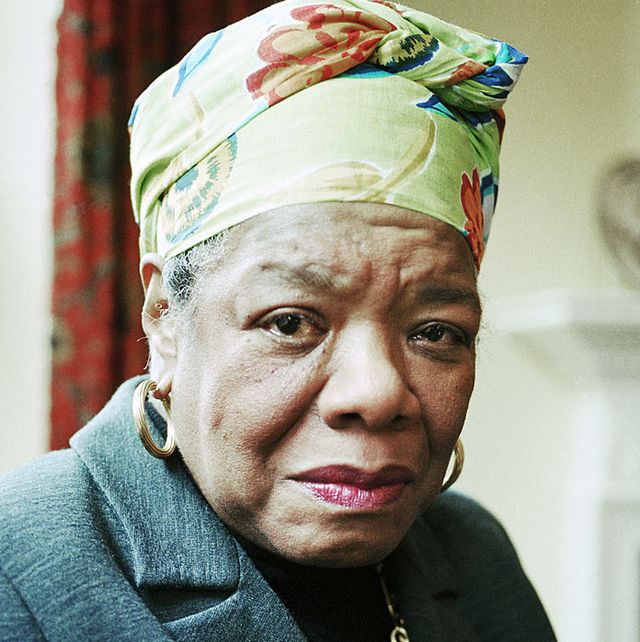
Our editors handpick the products that we feature. We may earn commission from the links on this page.
“The world knows her as a poet, but at the heart of her, she was a teacher,” Oprah said of Angelou. “‘When you learn, teach. When you get, give’ is one of my best lessons from her.”
Referred to by Oprah as her “mentor, mother/sister, and friend,” Angelou—who died in 2014 at age 86—spent her life offering earned wisdom to society through countless poems, essays, and memoirs, bravely sharing her many trials and tribulations—but also triumphs— as a Black woman in America. But just like Oprah, Angelou’s candor encouraged many people to maintain hope during even in the darkest of times.
From her profound I Know Why the Caged Bird Sings to the lyrical And Still I Rise , Angelou continues to inspire us through her written words, and the indelible example she set . And though it was ( really ) difficult, we narrowed down her vast body of work to the 10 most essential in her repertoire. But worry not: We’ve also drawn up a complete list of her work, should you want to expand your study of this remarkable writer.
.css-belsrh{clear:none;position:relative;word-break:break-word;text-align:center;padding-top:0.75rem;border-top:0.125rem solid #E61957;border-image-slice:1;border-image-source:linear-gradient(to right, #0ED2C6 0 15%, #7A3BAF, #FF3F44);}@media(max-width: 64rem){.css-belsrh{text-align:center;}.css-belsrh.align-left{max-width:100%;}.css-belsrh.align-right{max-width:100%;}}@media(min-width: 48rem){.css-belsrh{text-align:center;}}@media(min-width: 48rem) and (max-width: 61.25rem){.css-belsrh.align-left{max-width:min(20.625rem, calc((100vw - (1rem * 3))/2));float:left;margin-left:0rem;margin-right:1rem;}.css-belsrh.align-right{max-width:min(20.625rem, calc((100vw - (1rem * 3))/2));float:right;margin-right:0rem;margin-left:1rem;}}@media(min-width: 61.25rem) and (max-width: 90rem){.css-belsrh.align-left{max-width:20.625rem;float:left;clear:left;margin-right:1rem;}.css-belsrh.align-right{max-width:20.625rem;float:right;clear:right;margin-left:1rem;}}@media(min-width: 90rem){.css-belsrh.align-left{max-width:20.625rem;float:left;clear:left;margin-right:1rem;}.css-belsrh.align-right{max-width:20.625rem;float:right;clear:right;margin-left:1rem;}} .css-17pp2fn{position:absolute;top:-1rem;} @media(min-width: 48rem){.css-60ezry.size-large{display:grid;grid-template-columns:40% 1fr;grid-template-areas:"product_media product_details";}} .css-hep5d8{grid-area:product_header;-webkit-order:0;-ms-flex-order:0;order:0;} .css-i33oxz{font-weight:bold;margin:0rem;margin-top:0.625rem;margin-bottom:0.625rem;text-align:center;font-size:1.0625rem;line-height:1.2;font-family:Gilroy,Gilroy-weightbold-roboto,Gilroy-weightbold-local,Helvetica,Arial,Sans-serif;} I Know Why the Caged Bird Sings

With encouragement from friend and fellow groundbreaker James Baldwin , Angelou published her debut memoir, I Know Why The Caged Bird Sings . In it, she captures her childhood struggles with abuse and prejudice while also detailing how the contrasting freedom of her adolescence allowed her to find strength amid despair. The autobiography is arguably her most popular work, with Time magazine naming it an All-Time 100 Nonfiction Book.
“ I Know Why the Caged Bird Sings liberates the reader into life simply because Maya Angelou confronts her own life with such a moving wonder, such a luminous dignity,” Baldwin said of it.
Just Give Me a Cool Drink of Water 'Fore I Diiie
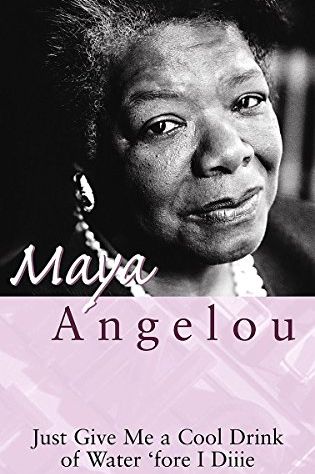
In her first collection of poetry, Angelou uses 38 different lyrical titles as social commentary through which she explores themes of love, racism, and nostalgia. With poems like “They Went Home,” “Times-Square-Shoe-Shine-Composition,” and “No Loser, Now Weeper,” the work earned her a Pulitzer Prize nomination .
Gather Together in My Name
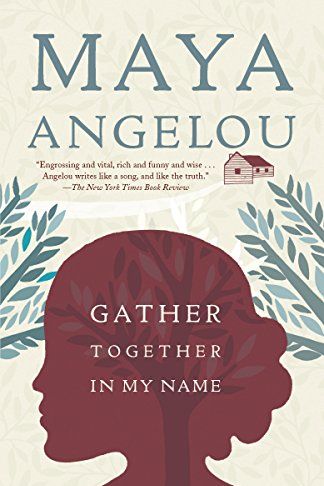
A follow up to I Know Why the Caged Bird Sings , Angelou lets readers in on her life post-World War II. She's a teen mother to a young son named Clyde, struggling to provide for him as she's in-and-out of relationships and jumping from job to job. It's a story of a young woman trying to find herself in the midst of parental responsibility—while the lure of drugs and crime nearly takes her life in an unfortunate direction.
And Still I Rise
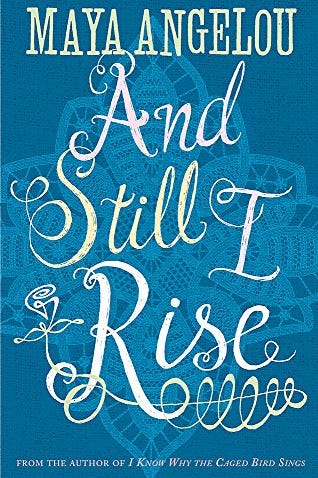
Home to one of Angelou's most praised poems, “Phenomenal Woman,” this volume celebrates everything from dreams and lively Saturday nights to freedom and the sounds of the South. Through an energetic rhythm and written prowess, Angelou honors life—and the good and bad that comes with it.
“... The stride of my step/ The curl of my lips./ I’m a woman/ Phenomenally./ Phenomenal woman,/ That’s me.”
The Heart of a Woman
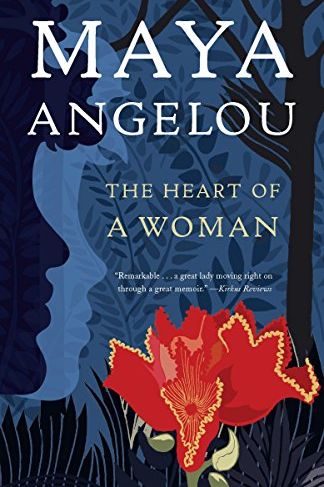
In her fourth memoir, Angelou moves with her son to New York City, quickly becoming involved in the rich artistic culture of the city's Black creatives. It's here where she discovers her true passion for the written word after reading her work at the Harlem Writer's Guild. Simultaneously, she falls in love with a man who shows her that there's even more to life beyond the city.
On the Pulse of Morning: The Inaugural Poem
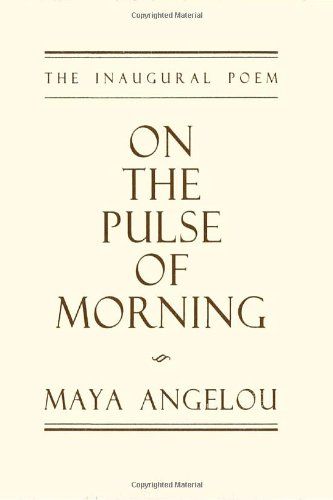
Read at President Bill Clinton's inauguration in January 1993 on a public television broadcast, “On the Pulse of Morning” sent a message of unity and equality to countless Americans in what the president called an “electrifying reading.” The historic event saw Angelou bring her signature soulful prose to a national stage.
“In my work, in everything I do, I mean to say that we human beings are more alike than we are unalike,” she told The Los Angeles Times in 1993, “and to use that statement to break down the walls we set between ourselves because we are different.”
You can watch Angelou recite “In the Pulse of Morning” here .
Wouldn't Take Nothing for My Journey Now
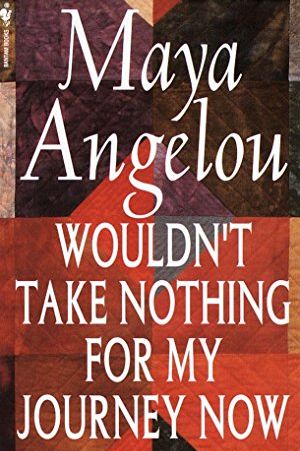
Soon after her lauded poetry reading at the inauguration, Angelou published her first book of short essays. With lyrical prose, you're treated to her thoughts on topics such as style, death, racism, and self-love, plus how she feels the power of spirituality can help guide and fulfill your life.
Phenomenal Woman
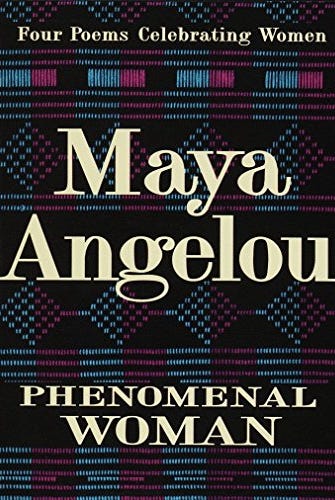
This collection includes four of Angelou's most popular works—“Phenomenal Woman,” “Still I Rise,” “Weekend Glory,” and “Our Grandmothers” — with every poem focused on empowering females everywhere.
Letter to My Daughter
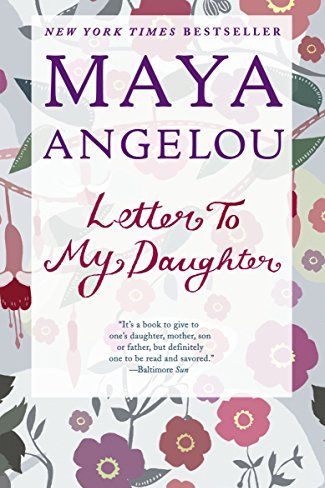
Through a series of candid essays, Angelou writes to the daughter she never had, and in effect opens up to the millions of fans she's gained over the years. Through stories of her tumultuous youth, motherhood, loss, and personal growth, she provides a lesson on what it means to learn to find fulfillment despite life's curveballs.
Mom & Me & Mom
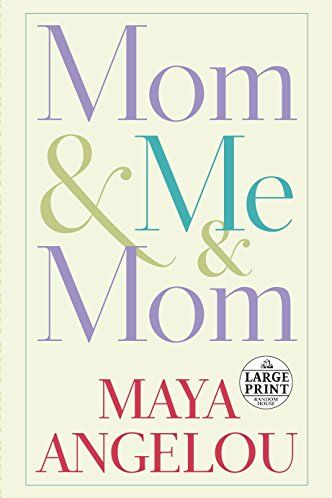
For the first time in all of her memoirs, Angelou describes the tense relationship she shared with her mother, Vivian Baxter, who sent her away to live with her grandmother when Angelou was just 3. They were reunited 10 years later, but the writer's lingering feelings of abandonment and resentment are what she must fight to overcome as she and Baxter work to repair their relationship.
A Complete List of Maya Angelou Works
Poetry Maya Angelou: The Complete Poetry Rainbow in the Cloud I Know Why the Caged Bird Sings Amazing Peace Just Give Me a Cool Drink of Water 'fore I Diiie Oh Pray My Wings Are Gonna Fit Me Well His Day Is Done Phenomenal Woman Celebrations A Song Flung Up to Heaven Shaker, Why Don't You Sing? Amazing Peace And Still I Rise The Complete Collected Poems of Maya Angelou
Autobiography Mom & Me & Mom Singin' and Swingin' and Gettin' Merry Like Christmas All God's Children Need Traveling Shoes The Heart of a Woman I Shall Not Be Moved Gather Together in My Name Even the Stars Look Lonesome Letter to My Daughter The Collected Autobiographies of Maya Angelou
Children Life Doesn't Frighten Me My Painted House, My Friendly Chicken, and Me Maya's World Series
Cookbooks Hallelujah! The Welcome Table Great Food, All Day Long
Religion Wouldn't Take Nothing for My Journey Now
For more ways to live your best life plus all things Oprah, sign up for our newsletter!

McKenzie Jean-Philippe is the editorial assistant at OprahMag.com covering pop culture, TV, movies, celebrity, and lifestyle. She loves a great Oprah viral moment and all things Netflix—but come summertime, Big Brother has her heart. On a day off you'll find her curled up with a new juicy romance novel.

The Funeral Crasher

The 28 Best Books of Fall

Barack Obama Shares HIs 2024 Reading List

Foolproof Recipes Inspired by Familiaris

Julianne Hough: Books That Made a Difference

Sizzling Summer Mysteries

David Wroblewski’s Bannock

Frank’s “Mexican Lobotomy” Cocktail

Soothing Books for Chaotic Times

How Did Family Dogs End Up on WWII Front Lines?

Michelle Obama Announces Her New Book
- Biographies & Memoirs
- Arts & Literature

Sorry, there was a problem.

Download the free Kindle app and start reading Kindle books instantly on your smartphone, tablet, or computer - no Kindle device required .
Read instantly on your browser with Kindle for Web.
Using your mobile phone camera - scan the code below and download the Kindle app.

Image Unavailable

- To view this video download Flash Player
Follow the author

Letter to My Daughter Paperback – October 27, 2009
- Print length 192 pages
- Language English
- Publisher Random House Trade Paperbacks
- Publication date October 27, 2009
- Dimensions 5.21 x 0.48 x 8 inches
- ISBN-10 0812980034
- ISBN-13 978-0812980035
- See all details

From the Publisher

| Customer Reviews | ||||||
|---|---|---|---|---|---|---|
| Price | — | $7.50$7.50 | $1.25$1.25 | — | $9.58$9.58 | — |
| Maya Angelou’s debut memoir is a modern American classic beloved worldwide | A complete collection of poetry, including Maya Angelou's inaugural poem “On the Pulse of Morning” | A collection of beloved poems about women from the iconic Maya Angelou | A moving memoir about the legendary author’s relationship with her own mother | Read unforgettable vignettes of Billie Holiday and Malcom X, as Maya Angelou chronicles the burdens of a Black mother in America | Maya Angelou’s classic memoirs have had an enduring impact on American literature and culture |
Editorial Reviews
About the author, excerpt. © reprinted by permission. all rights reserved., product details.
- Publisher : Random House Trade Paperbacks; Trade Paperback Edition (October 27, 2009)
- Language : English
- Paperback : 192 pages
- ISBN-10 : 0812980034
- ISBN-13 : 978-0812980035
- Item Weight : 5.6 ounces
- Dimensions : 5.21 x 0.48 x 8 inches
- #79 in Author Biographies
- #114 in Black & African American Biographies
- #284 in Women's Biographies
Videos for this product

Click to play video

Worth the Read
Jessica Yates

Smiling Wisdom - Daughter Granddaughter Gifts
About the author
Maya angelou.
Maya Angelou has been waitress, singer, actress, dancer, activist, filmmaker, writer and mother. As well as her autobiography she has written several volumes of poetry, including 'On the Pulse of the Morning' for the inauguration of President Clinton. She now has a life-time appointment as Reynolds Professor of American Studies at Wake Forest University in North Carolina.
Customer reviews
- 5 star 4 star 3 star 2 star 1 star 5 star 79% 13% 6% 2% 1% 79%
- 5 star 4 star 3 star 2 star 1 star 4 star 79% 13% 6% 2% 1% 13%
- 5 star 4 star 3 star 2 star 1 star 3 star 79% 13% 6% 2% 1% 6%
- 5 star 4 star 3 star 2 star 1 star 2 star 79% 13% 6% 2% 1% 2%
- 5 star 4 star 3 star 2 star 1 star 1 star 79% 13% 6% 2% 1% 1%
Customer Reviews, including Product Star Ratings help customers to learn more about the product and decide whether it is the right product for them.
To calculate the overall star rating and percentage breakdown by star, we don’t use a simple average. Instead, our system considers things like how recent a review is and if the reviewer bought the item on Amazon. It also analyzed reviews to verify trustworthiness.
Customers say
Customers say the stories in the book are amazing and full of wisdom and life experiences. They also find the tone compelling, sympathetic, and comforting. Readers describe the character as real, inspiring, and strong. They praise the writing style as very well written and beautifully narrated.
AI-generated from the text of customer reviews
Customers find the book full of wisdom and life experiences of Maya Angelou. They say it draws them in with its simplicity and clarity. Readers also appreciate the motherly wit, intellectual wisdom, compassion, and honesty.
"This is one of the best books I have ever read. Easy to read, draws you in as though it speaks to concerns that may affect anyone...." Read more
"...And this book, being accessible and honest for any audience , is an excellent way to introduce yourself to her work...." Read more
"Good read, very educational woman !" Read more
"...to author Maya Angelou read from her book is both soothing and spiritual . Her voice calms me, yet her life experiences are far from calm...." Read more
Customers find the writing style very well written, frank, and beautiful. They also say it's an enjoyable, quick read that speaks to them. Customers also appreciate the sweetness of the message.
"This is one of the best books I have ever read. Easy to read , draws you in as though it speaks to concerns that may affect anyone...." Read more
"...Maya Angelou is a great poet and this book represents her style and her identity. Sweet and emotional. Love it!" Read more
"Maya Angelou only writes the most wonderful literature and poetry . This book proves my claim." Read more
"Maya Angelou is a compassionate and gifted writer , in addition to being an astounding mother, daughter, civil rights activist, educator, and more!..." Read more
Customers find the book a fabulous gift.
"...Would make an excellent gift " Read more
" Great gift , nice price" Read more
"...Amazing advise. This is the perfect gift for your daughter or your “sister-friend” or anyone you would like to bless with nuggets of wisdom." Read more
"This is a great book to give as a gift or to treat yourself to...." Read more
Customers find the tone compelling, sympathetic, comforting, heart wrenching, and nurturing. They also mention that the book teaches lessons on inner fortitude and altruistic, peaceful, and kind parts of you.
"...Sweet and emotional . Love it!" Read more
"Listening to author Maya Angelou read from her book is both soothing and spiritual. Her voice calms me, yet her life experiences are far from calm...." Read more
"...This book reveals her motherly wit, intellectual wisdom, compassion towards humanity , as if offers lessons which reveal life's truths, pain and..." Read more
"This collection of autobiography was a comforting , reassuring read after enduring the passing and physical loss of such a profound, prolific, poetic..." Read more
Customers find the stories in the book amazing, wonderful, and quick reads. They say the author changes the narrative and brings life to each essay. Readers also say the stories smoothly enter the reader's soul and transform the imagination.
"...There are so many short stories in the book that display not only Angelous wisdom but her desire to share her wealth of knowledge with her inherited..." Read more
"...Maya uses words that are like laser. They smoothly enter the reader's soul and transform the imagination with a force that digs deeper into the..." Read more
"...She changes the whole narrative and brings life to each essay." Read more
"Wonderful book - it was a quick read with several short stories ...." Read more
Customers find the character in the book real and heroic. They also say the book is great for anyone who loves Maya Angelou.
"... With grit , truth, wit, and humility Ms. Angelou has imparted her worldly wisdom on how we as women can embrace ourselves, love others, and be..." Read more
"I loved this book. It would be great for anyone who loves Maya Angelou ." Read more
"...She is an amazing woman ." Read more
"...She is funny, inspirational and such an amazingly strong woman that I would suggest every young lady read this book." Read more
Customers find the book entertaining, fun, and interesting. They also appreciate the author's wit, humility, and grit.
"...With grit, truth, wit , and humility Ms. Angelou has imparted her worldly wisdom on how we as women can embrace ourselves, love others, and be..." Read more
"...insightful, heartwarming, sometimes prophetic, even fun, but never boring . This book helped me to realize what I wanted to say to my daughter...." Read more
"...Reading her works are always a joy. It makes you laugh , cry, and it makes you hopeful. "..." Read more
"...There is so much honesty here. It made me laugh and cry and THINK ...." Read more
Customers are mixed about the length of the book. Some mention it's very short, while others say the brevity is frustrating. However, some find the story hard to put down and difficult to continue without taking the time to digest.
"Read this book in maybe 3 days. It's a short read but only because one cannot put it down, every lesson is so relevant!..." Read more
"...All are well written, but the brevity of each is frustrating because I would like to have read more on each subject...." Read more
"...This book was very short , and much of what is in it was also in that book. That said, her work is always amazing!" Read more
"...good. This book is short and sweet. Filled with lots of informationin reference to Ms Angelou's life. I recommend ( 5 stars )this book." Read more
Reviews with images

- Sort reviews by Top reviews Most recent Top reviews
Top reviews from the United States
There was a problem filtering reviews right now. please try again later..
Top reviews from other countries
- About Amazon
- Investor Relations
- Amazon Devices
- Amazon Science
- Sell products on Amazon
- Sell on Amazon Business
- Sell apps on Amazon
- Become an Affiliate
- Advertise Your Products
- Self-Publish with Us
- Host an Amazon Hub
- › See More Make Money with Us
- Amazon Business Card
- Shop with Points
- Reload Your Balance
- Amazon Currency Converter
- Amazon and COVID-19
- Your Account
- Your Orders
- Shipping Rates & Policies
- Returns & Replacements
- Manage Your Content and Devices
- Conditions of Use
- Privacy Notice
- Consumer Health Data Privacy Disclosure
- Your Ads Privacy Choices

IMAGES
COMMENTS
Maya Angelou (born Marguerite Ann Johnson; April 4, 1928 - May 28, 2014) was an American author and poet. She published seven autobiographies, three books of essays, and several books of poetry, and is credited with a list of plays, movies, and television shows spanning more than fifty years. She received dozens of awards and over thirty ...
Angelou also wrote occasional poems, including A Brave Startling Truth (1995), which commemorated the founding of the United Nations, and Amazing Peace (2005), a poem written for the White House Christmas tree-lighting ceremony. Angelou published multiple collections of essays.
Maya Angelou ( / ˈændʒəloʊ / ⓘ AN-jə-loh; [ 1][ 2] born Marguerite Annie Johnson; April 4, 1928 - May 28, 2014) was an American memoirist, poet, and civil rights activist. She published seven autobiographies, three books of essays, several books of poetry, and is credited with a list of plays, movies, and television shows spanning ...
Poet, dancer, singer, activist, and scholar Maya Angelou was a world-famous author. She was best known for her unique and pioneering autobiographical writing style. On April 4, 1928, Marguerite Ann Johnson, known to the world as Maya Angelou, was born in St. Louis, Missouri. Due to her parents' tumultuous marriage and subsequent divorce ...
Maya Angelou (born April 4, 1928, St. Louis, Missouri, U.S.—died May 28, 2014, Winston-Salem, North Carolina) was an American poet, memoirist, and actress whose several volumes of autobiography explore the themes of economic, racial, and sexual oppression.. Although born in St. Louis, Angelou spent much of her childhood in the care of her paternal grandmother in rural Stamps, Arkansas.
Angelou was born Marguerite Johnson on April 4, 1928, in St. Louis, Missouri. Her father, Bailey, was a doorkeeper and naval dietician; her mother, Vivian, was a nurse and realtor. Angelou's ...
NEW YORK TIMES BESTSELLER • Maya Angelou shares her path to living well and with meaning in this absorbing book of personal essays. Dedicated to the daughter she never had but sees all around her, Letter to My Daughter transcends genres and guidebook, memoir, poetry, and pure delight. Here in short spellbinding essays are glimpses of the ...
Maya Angelou was born Marguerite Ann Johnson on April 4, 1928, in St. Louis. ... this 2008 book of essays features Angelou's advice for young women about living a life of meaning.
In 2008, Maya Angelou (April 4, 1928-May 28, 2014) — one of the greatest spirits of the past century — penned Letter to My Daughter (public library), a collection of 28 short meditations on subjects as varied as violence, humility, Morocco, philanthropy, poetry, and older lovers, addressed to the daughter she never had but really a blueprint to the life of meaning for any human being ...
Essays and criticism on Maya Angelou, including the works Still rising, Sass and anger, Pride in ancestors, Guilt and responsibility, New dreams - Critical Survey of Poetry: American Poets
In counting all our tears and sighs. Nay let them only see us while. We wear the mask. We smile but oh my God. Our tears to thee from tortured souls arise. And we sing Oh Baby doll, now we sing…. The clay is vile beneath our feet. And long the mile. But let the world think otherwise.
Maya Angelou Angelou's autobiographies are distinct in style and narration, and "stretch over time and place", from Arkansas to Africa and back to the US. They take place from the beginnings of World War II to the assassination of Martin Luther King Jr. Angelou wrote collections of essays, including Wouldn't Take Nothing for My Journey Now (1993) and Even the Stars Look Lonesome (1997), which ...
Essays and criticism on Maya Angelou, including the works "Steady Going Up", "The Reunion" - Critical Survey of Short Fiction
By Dr Oliver Tearle (Loughborough University) Maya Angelou (1928-2014) was not just a poet, of course: she was an influential civil rights campaigner in the United States, and her autobiography, I Know Why The Caged Bird Sings, is a classic of the genre.But several of her poems are well-known, and she was popular as a poet during her lifetime and a couple of the poems that follow, at the very ...
Maya Angelou (1928-2014) had a broad and distinguished career both inside and outside the literary realm. She is most famous for her work as a poet, memoirist, and civil rights activist, working with Dr. Martin Luther King Jr. and Malcolm X. She also worked in entertainment as a singer, a dancer, an actor, and a director.
Maya Angelou was an American writer and civil rights activist. Angelou is best known for her many books of poetry and autobiographies, as well as her active participation in the Civil Rights Movement, which involved working with Martin Luther King Jr. and Malcolm X. Born Marguerite Annie Johnson in St. Louis, Missouri, Angelou's parents ...
Equality" by Maya Angelou was published in 1978 in her collection And Still I Rise. The poem uses powerful repetition and vivid imagery to convey the speaker's unwavering determination in the fight for equality and freedom. Angelou uses metaphors like "blinders" and "padding" to represent societal barriers imposed upon the speaker ...
The American poet Maya Angelou's "Life Doesn't Frighten Me" was first published as a picture book (illustrated by the painter Jean-Michel Basquiat) in 1993. In this poem, a little girl claims that she's not the least bit frightened of—well, anything, from "panthers" to "tough guys." While her list of the things she's not frightened of might ...
The light of the world has grown a little dimmer with the loss of the phenomenal Maya Angelou (April 4, 1928-May 28, 2014), but her legacy endures as a luminous beacon of strength, courage, and spiritual beauty. Angelou's timeless wisdom shines with unparalleled light in a 1977 interview by journalist Judith Rich, found in Conversations with Maya Angelou (public library) — the same ...
Essays and criticism on Maya Angelou - Critical Essays. In an interview, Angelou described her autobiographical style in the following way: "I've used, or tried to use, the form of the Black ...
Referred to by Oprah as her "mentor, mother/sister, and friend," Angelou—who died in 2014 at age 86—spent her life offering earned wisdom to society through countless poems, essays, and memoirs, bravely sharing her many trials and tribulations—but also triumphs—as a Black woman in America. But just like Oprah, Angelou's candor ...
NEW YORK TIMES BESTSELLER • Maya Angelou shares her path to living well and with meaning in this absorbing book of personal essays. Dedicated to the daughter she never had but sees all around her, Letter to My Daughter transcends genres and categories: guidebook, memoir, poetry, and pure delight. Here in short spellbinding essays are glimpses of the tumultuous life that led Angelou to an ...
Maya Angelou's "Graduation" is often printed as a stand-alone essay, but is also a chapter in the author's first autobiography, I Know Why the Caged Bird Sings.The piece begins with a description ...
Marguerite Annie Johnson, más conocida como Maya Angelou (San Luis, Misuri; 4 de abril de 1928-Winston-Salem, Carolina del Norte; 28 de mayo de 2014), fue una escritora, poeta, cantante y activista por los derechos civiles estadounidense.Publicó siete autobiografías, tres libros de ensayos y varios libros de poesía.Participó, asimismo, ya fuera como actriz, bailarina, directora o ...